2021 Broadcast
On November 8, 2021, Omar El Akkad was named the winner of the 2021 Scotiabank Giller Prize for his novel, What Strange Paradise, published by McClelland & Stewart, taking home $100,000 courtesy of Scotiabank.
2021 Shortlist
The 2021 Scotiabank Giller Prize jury announced its shortlist on Tuesday, October 5, 2021. The five titles were chosen from a longlist of 12 books announced on September 8, 2021. One hundred and thirty two titles were submitted from publishers across the country.
2021 Longlist
The 2021 Scotiabank Giller Prize jury announced its longlist on Wednesday, September 8, 2020. The 12 titles were chosen from a field of 132 books submitted by publishers all across Canada.
Astra by Cedar Bowers
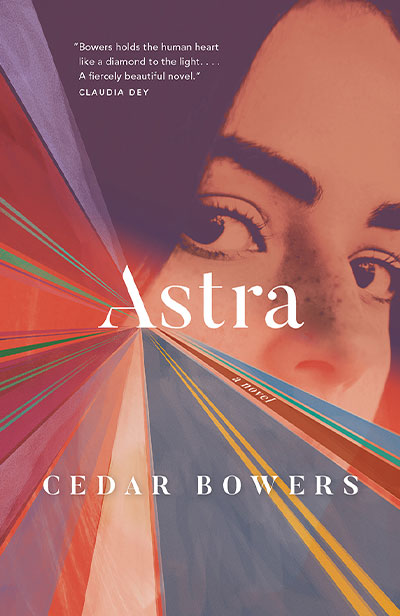
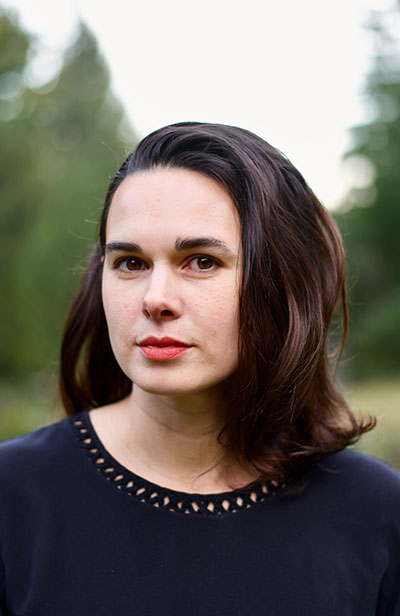
CEDAR BOWERS’s fiction has been published in Joyland and Taddle Creek. Astra is her first novel. With her husband, novelist Michael Christie, and their two children, she divides her time between Galiano Island, where she grew up, and Victoria.
Instagram: @cedar.bowers
Website: cedarbowers.com
Astra by Cedar Bowers
Gloria arrived with the influx of spring workers in March, and after a long winter alone in the one-room fir cabin that he’d built his first winter at the Farm, Raymond found himself drawn to her quick laugh and broad shoulders, so he let her spend a few nights in his bed. When it soon became clear she was interested in more, he requested she move into the yurt with the others, carefully explaining that he didn’t believe in monogamous relationships, that he treasured his indepen- dence, that he never planned on being tied down. Gloria cited this as the reason she kept the pregnancy from him until June, and why she announced the news publicly during the morn- ing breakfast meeting rather than talking to him one-on-one. After the women finished their congratulations, running their fingers over her small, taut belly and kissing her full cheeks, Raymond pulled her aside to explain yet again that he wasn’t that kind of man. Not the kind who got married or provided or believed that A and B led to C. He wasn’t going to move to the city, cut his hair, get a job in a bank, or some other bullshit like that. He wasn’t going to buy a house or a stroller, because on and on it would go. He’d been called to Celestial for a reason, and nothing was going to distract him or slow him down. If Gloria was hoping he’d build a family with her, or that she’d get a declaration of love, she’d set her sights on
the wrong man.
Despite Raymond’s unwavering stance, Gloria stuck around Celestial all summer long. Sometimes she searched him out by the river or in the gardens; or she bravely knocked on his cabin door to show him a sweater she’d crocheted for the baby, or to update him on the kicks she felt at night. When he encountered her like this, both vulnerable and stub- born, Raymond looked anywhere but into her wide, hazel eyes and pointed out that it would be better if she left and got her mother’s help. He had no business getting involved with her child.
“Our child,” Gloria reminded him firmly. “If you say so,” he said, closing the door.
Summer turned to fall, yet even after most of the seasonal workers had returned to the city to luxuriate in the conve- nience of electric heat, Gloria showed no sign of going any- where. So in October, long after her belly began protruding through her embroidered dresses, the hems riding up her thighs as the baby swelled, Raymond took further pains to avoid her. First, he removed his few belongings from his cabin and set up camp by the river. Then he stopped leading the morning meetings and hiking up the hill for the communal meals. Instead he foraged kale, carrots, fennel, and zucchini from the gardens, and he grew even skinnier.
In November, Doris, his childhood friend and the co-founder of Celestial, informed him that she and Gloria’s friend, Clodagh, had moved Gloria into his cabin where it was warmer, and that even though everyone else had gone for the winter, they were going to stay on until the baby arrived— they didn’t want the poor woman to be all alone. Though this bothered him, he was still confident that with time, Gloria would realize what a mistake she was making, and so he sol- diered on. He spent his nights on the slate-rock riverbank, head resting on his rolled-up jacket, gazing up at the flicker- ing light of the stars scattered across the sky. And when the weather grew too cold for that, he began sleeping in the small hayloft in the animal shed with the nanny goats, holding out for the morning he’d wake to discover that the woman and her pregnant belly had finally gone. Or, even better, he’d wake up to discover the whole fiasco had been a terrible dream.
Now it’s mid-December, and Raymond is at the top of a tall wooden ladder while the new kid, Wesley, clings firmly to the lower rails, steadying the contraption over the rocky soil. They are framing a twenty-foot-high, geodesic greenhouse that only needs five more windows before it’s completely winterized, and in the distance the sparrows and thrushes are singing, and the river’s winter-swollen waters are gurgling under the thin ice. Nature’s cacophony is normally the only soundtrack at the Farm, but today something else has been drifting down from the Encampment since dawn: the women are singing. With determination. Raymond can make out their wavering harmonies in the breeze.
Hooking his hammer in his back pocket, he begins his descent, when from below Wesley lets out a holler and the ladder careens to the left. Raymond’s tread-bare gumboots lose their footing, and the rails start sliding through his gloved hands. Thankfully, after falling only a few feet, he manages to grab ahold of the ladder again and maneuver his way to the ground in one piece.
Shaken, he rubs his jaw through his long, tangled beard as the boy watches him closely.
“I’m real sorry about that, it’s just those women up there are driving me crazy,” Wesley stammers, his face red and worried-looking, like he expects a beating.
“No problem. No one died.”
Wesley points to the hill. “Can’t you hear them? What do you think that’s all about? They’re going on and on, singing the same song.”
Raymond shrugs. “I couldn’t tell you,” he says, though he’s pretty sure he knows the reason behind it.
Leaving the boy to put away the ladder, Raymond zips his jacket up against the cold and wanders towards the paddock, still a little shaky from the fall. As he goes, he surveys his sur- roundings: the ten acres of vegetable gardens, waiting for spring planting; the fledgling apple orchard; the almost-done geodesic dome; and all that land on the other side of the deer fence, patiently waiting for Celestial to retain enough people to tend it. Physically, the Farm hasn’t changed with the com- ing baby. But it feels different. In jeopardy. Raymond pulls a toothpick from his pocket, and tucks it in his cheek.
Inside the paddock, Brave, their best milk-goat, clops across the packed earth towards him. Raymond squats and allows her to root in his pockets for corn. He strains his ears, and is relieved to find he can’t hear the women singing any- more. Besides the goat’s eager grunts, Celestial is eerily quiet now. It’s possible there’s a high wind blowing the women’s voices down the other side of the hill, away from the valley. Or maybe Gloria has been lying all along. Maybe under that dress she’s only been hiding a large balloon. The knot: her belly button.
Raymond closes his eyes. Prays to the emptiness. Then to the stars, to the cosmos, to all of Mother Nature that sur- rounds him, because what else can he do?
Hearing the sound of distant feet crunching through the frost, he lifts his head and is surprised to see Doris heading his way. She’s been pissed off at him since the summer because of this business with Gloria, and then when Wesley showed up a few weeks ago—skinny, pale, and obviously weaning himself off some concoction of hard drugs—she only grew angrier. Doris insisted that they turn him away. She didn’t want Raymond distracted by some messed-up kid when clearly there was other shit he needed to deal with. But by that point there were only women left at Celestial, and, truth- fully, Raymond wanted someone sympathetic to his side of things, so he went behind Doris’s back and told the boy he was welcome to stay.
—
Excerpted from ASTRA. Copyright © 2021 by Cedar Bowers. Excerpted by permission of McClelland & Stewart. All rights reserved. No part of this excerpt may be reproduced or reprinted without permission in writing from the publisher.
What Strange Paradise by Omar El Akkad
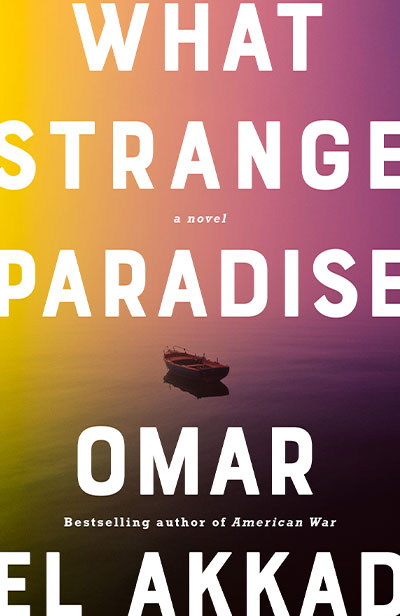
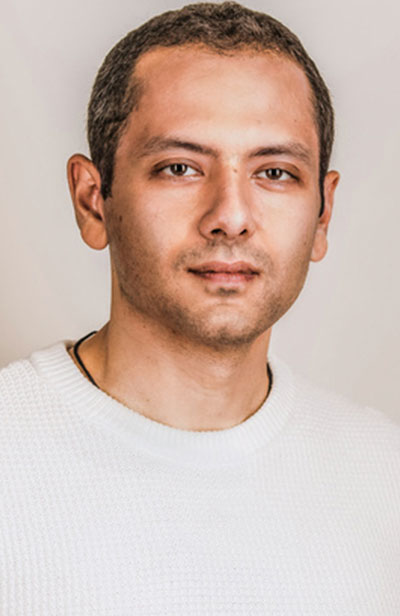
OMAR EL AKKAD is an author and journalist. His debut novel, American War, was an international bestseller and has been translated into thirteen languages. It won the Pacific Northwest Booksellers Association Award, the Oregon Book Award for fiction, and the Kobo Emerging Writer Prize. He lives in Portland, Oregon.
Twitter: @omarelakkad
Instagram: @oelakkad
Website: omarelakkad.com
Jury Citation
Amid all the anger and confusion surrounding the global refugee crisis, Omar El Akkad’s What Strange Paradise paints a portrait of displacement and belonging that is at once unflinching and tender. In examining the confluence of war, migration and a sense of settlement, it raises questions of indifference and powerlessness and, ultimately, offers clues as to how we might reach out empathetically in a divided world.
What Strange Paradise by Omar El Akkad
Chapter One
After
The child lies on the shore. All around him the beach is littered with the wreckage of the boat
and the wreckage of its passengers: shards of decking, knapsacks cleaved and gutted, bodies frozen in unnatural contortion. Dispossessed of nightfall’s temporary burial, the dead ferment indecency. There’s too much of spring in the day, too much light.
Facedown, with his arms outstretched, the child appears from a distance as though playing at flight. And so too in the bodies that surround him, though distended with seawater and hardening, there flicker the remnants of some silent levitation, a severance from the laws of being.
The sea is tranquil now; the storm has passed. The island, despite the debris, is calm. A pair of plump orange-necked birds, stragglers from a northbound flock, take rest on the lamppost from which hangs one end of a police cordon. In the breaks between the wailing of the sirens and the murmur of the onlookers, they can be heard singing. The species is not unique to the island nor the island to the species, but the birds, when they stop here, change the pitch of their songs. The call is an octave higher, a sharp, throat-scraping thing.
In time a crowd gathers near the site of the shipwreck, tourists and locals alike. People watch.
The eldest of them, an arthritic fisherman driven in recent years by plummeting cherubfish stocks to kitchen work at a nearby resort, says that it’s never been like this before on the island. Other locals nod, because even though the history of this place is that of violent endings, of galleys flipped over the axis of their oars and fishing skiffs tangled in their own netting and once, during the war, an empty Higgins lander sheared to ribbons by shrapnel, the old man is still, in his own way, right. These are foreign dead.
No one can remember exactly when they first started washing up along the eastern coast. But in the last year it has happened with such frequency that many of the nations on whose tourists the island’s economy depends have issued travel advisories. The hotels and resorts, in turn, have offered discounts. Between them, the coast guard and the morgue keep a partial count of the dead, and as of this morning it stands at 1,026 but this number is as much an abstraction as the dead themselves are to the people who live here, to whom all the shipwrecks of the previous year are a single shipwreck, all the bodies a single body.
Three officers from the municipal police force pull a long strip of caution tape along the breadth of the walkway that leads from the road to the beach. Another three wrestle with large sheets of blue boat-cover canvas, trying to build a curtain between the dead and their audience. In this way the destruction takes on an air of queer unreality, a stage play bled of movement, a fairy tale upturned.
The officers, all of them young and impatient, manage to tether the fabric to a couple of lampposts, from which the orange-necked birds whistle and flee. But even stretched to near-tearing, the canvas does little to hide the dead from view. Some of the onlookers shuffle awkwardly to the far end of the parking lot, where there’s still an acute line of sight between the draping and four television news trucks. Others climb on top of parked cars and sweep their cameras across the width of the beach, some with their backs to the carnage, their own faces occupying the center of the recording. The dead become the property of the living.
Oriented as they are, many of the shipwrecked bodies appear to have been spat up landward by the sea, or of their own volition to have walked out from its depths and then collapsed a few feet later. Except the child. Relative to the others he is inverted, his head closest to the lapping waves, his feet nestled into the warmer, lighter sand that remains dry even at highest tide. He is small but somewhere along the length of his body marks the sea’s farthest reach.
A wave brushes gently against the child’s hair. He opens his eyes.
At first he sees nothing, his sight hampered by the sting of salt and sand and strands of his own matted hair in his eyes. His surroundings appear to him as if behind frosted glass, or on the remembering end of a dream.
But other senses awake. He hears the sound of the sea, tame and metronomic. And beneath that, the hushed conversation of two men, inching closer to where he lies.
The child blinks the silt from his eyes; the world begins to take shape. To his left the beach curves in a long, smooth crescent until it disappears from view behind the rise of a rocky hill lined with thin, palm-like trees. It is a beautiful place, tropical and serene.
For a moment he doesn’t register the dead, only their belongings: ball caps and cell phones and sticks of lip balm and forged identification cards tucked into the cheapest kind of waterproof container, tied-up party balloons. Bright-orange life vests, bloated as blisters, some wrapped around their owners, others unclaimed. A phrase book. A pair of socks.
The boy’s neck is stiff and it hurts to move, but he turns slightly in the direction of the sea. In the shallows sits a rubber dinghy outfitted with police lights. Farther out, the water sheds its sandy complexion and turns a turquoise of such clarity that the tourists’ sailboats seem to float atop their own shadows.
Two men approach. Baggy white containment suits cover their bodies and white gloves their hands and white masks their faces, and vaguely they remind the boy of astronauts. They move slowly around and over the bodies, occasionally nudging at them with their feet and waiting for a response. Some of the corpses they inspect wear small glittering things around their fingers or necks. The boy watches, unmoving, as the masked workers bend down and carefully pocket anything that sparkles. They speak a language he doesn’t understand. They move toward him.
The boy doesn’t take his eyes off them. His clothes, soaked with salt water, hold fast to his frame; he flicks his toes in the tiny puddles collected in his shoes. His jaw aches. He lifts his head from the sand. He rises.
Seeing him, one of the two workers takes off his face mask and yells. The words mean nothing to the boy but by the gesticulations he gathers that he is being ordered not to move.
The man turns, first to his colleague and then, his voice even louder now, to the officers stationed at the edge of the beach. Once alerted, they begin to sprint in the boy’s direction.
The boy looks around him. To his left, past where the beach ends at a small gravel road packed with police cars and ambulances and trucks with large satellites affixed to their roofs, there stands a dense forest of the same palm-like trees that bookend the far hillside, their crowning leaflets like the skeletal remains of some many-limbed starfish, or a firework mid-burst. Everywhere else the sun shines brightly, but in the shade of the canopy there is a darkened thicket, perhaps a hiding place.
The men rush closer, yelling alien things. Pinned between the water and the land, the child turns toward the sheltering trees. He runs.
—
Excerpted from WHAT STRANGE PARADISE. Copyright © 2021 by Omar El Akkad. Excerpted by permission of McClelland & Stewart. All rights reserved. No part of this excerpt may be reproduced or reprinted without permission in writing from the publisher.
Glorious Frazzled Beings by Angélique Lalonde
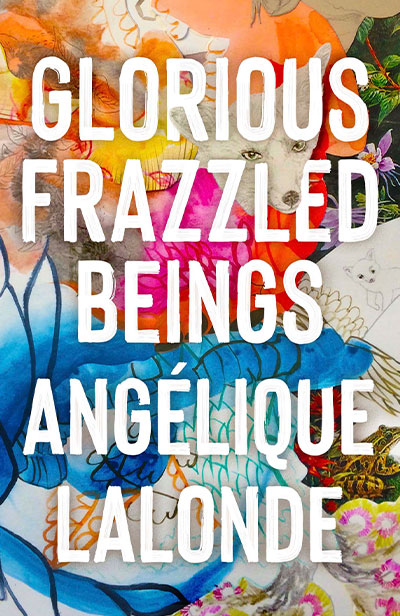

ANGÉLIQUE LALONDE was the recipient of the 2019 Journey Prize, has been nominated for a National Magazine Award, and was awarded an Emerging Writer’s residency at the Banff Centre. Her work has been published in numerous journals and magazines. She holds a Ph.D. in Anthropology from the University of Victoria. Lalonde is the second-eldest of four daughters. She dwells on Gitxsan Territory in Northern British Columbia with her partner, two small children, and many non-human beings.
Website: angliquelalonde.com
Jury Citation
Menopausal gods, procreating droids and boys born as foxes are only a modest few of the glorious frazzled beings that populate Angelique Lalonde’s astonishing story collection. Many of the ever-present concerns of the contemporary world—ecology, capital, conservation, gender fluidity, addiction, inequality, indigenous displacement, and the eternal limits of human perspective—find in Lalonde a beguiling literary voice equal to the age, pushing not only at the boundaries of literature but at those of articulation and being. Lalonde gravitates here to the fable and the fairy tale, familiar and estranging in equal measure, to claw at the divide between our world and others—the animal, the alien—while inevitably falling back on, and forgiving, the ever-flawed human being.
Glorious Frazzled Beings by Angélique Lalonde
The lady with the big head is out there in the misty morning. Is she wearing a veil? What is she doing in my garden? The mist is sitting on the river, slightly spread over the land. I see the mountain beyond, and the lady with the big head stooped over my onions. Not like yesterday when the mist was so thick I wouldn’t have seen her if she had been there.
Was she out there yesterday, picking calendula seeds to save for next season? She didn’t ask me if she could tend my garden while I was in the house doing other things. She’s never talked to me at all. She avoids me if I try to approach her, floating off into the mist or the memory of mist, then reappearing later doing different things in different places. I saw her digging at an anthill with the bear that has been hanging around our yard. She used a stick and the bear used her big broad paws.
The lady with the big head was helping the bear, or the bear was helping the lady with the big head, I’m not sure which. Either way, they were digging up the anthill near the apple tree. I didn’t mind that. I had noticed the ants were in the sickly tree crawling all around and that probably was not a good sign, so maybe the lady with the big head and the bear were helping the apple tree too.
She might be taking some onions, or weeding, or eating slugs. I can’t tell exactly what she is doing because the veil that hangs down from her big head drapes over her body to the ground and hides her movements. Also the light has not yet come, only a faint blueness and all that mist. I could offer her a hot tea but if I walk out there she’ll float away from me.
Later I’ll go look and see if she has taken onions or left any knick-knacks. Once I found a spool of golden thread so strong, fine, and shiny, I knew it was magical. The kind of thread that could be used to build spiderwebs that are always visible no matter the light. Visible but still translucent, an ephemeral quality of there and not quite there, only gold instead of silver. It might be what she makes her veil out of, or at least what she uses to mend the veil, because now that I think of it the veil is not golden, it’s more of a purple-grey shadow. Sometimes she has it pulled back and I can almost make out her features as she goes about doing things ladies with big heads do. She looks a little bit like me and a little bit like Rod Stewart, which is an odd mix for a lady. A couple of times I’ve glimpsed her looking like my dog, John Black, who died last winter. She might have taken her skull from the forest, where we left the dog’s body, to use as a mask; it seems like something the lady with the big head would do.
Lady with the big head and the weight of her head
The lady with the big head is having trouble holding her head up. It’s dipping forward this week, jutting at the chin. A chiropractor would look at her and shudder, thinking of her unhappy spine, contorted and compressed by the heaviness of gravity. He would want to brace her somehow, crack her in all sorts of places, and have her do little exercises with devices of his own making to relieve the pressure on her neck.
Who can she consult for this, living as she does in the forest? Being only partway real? Who would book her in for an appointment with her lack of proper name and no address to speak of? No email or phone number to confirm a correct time? Who would make a call to the forest, following her trail to find where she is sleeping and wrench that crook from her neck? How would she pay them? Would a chiropractor accept dried mushrooms in payment for his services? Would he treat without an X-ray showing the insides of the lady with the big head’s troubled bones?
Instead we build her a device from which she can hang upside down, with a long flat back that inverts once she’s strapped herself in. I hang there a lot when she’s not using it, feeling the blood pool in my head, imagining my spine unkinking so more of my life can bubble up through that crazy central nerve cluster that sends messages all through my body, making it so I can know.
Lady with the big head has a dream
She had a quiet dream, the lady with the big head. It was quiet so she kept sleeping. If it had been a loud raucous dream she would have startled herself out of it. She does not want to dream raucous dreams. Still, sometimes she does. She seeps in my window and makes me dream them too.
—
Excerpted from GLORIOUS FRAZZLED BEINGS. Copyright © 2021 by Angélique Lalonde. Excerpted by permission of House of Anansi Press. All rights reserved. No part of this excerpt may be reproduced or reprinted without permission in writing from the publisher.
The Son of the House by Cheluchi Onyemelukwe-Onuobia
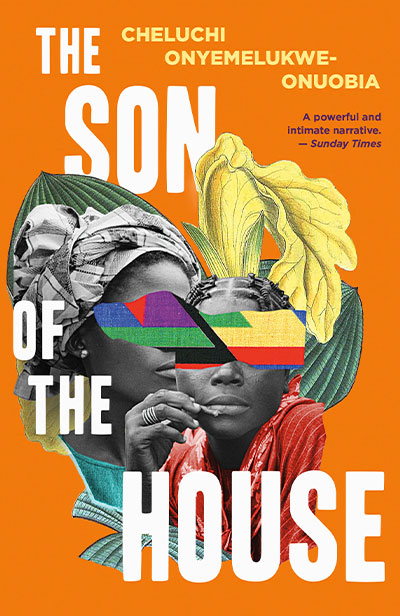

Cheluchi Onyemelukwe-Onuobia is a lawyer, academic, and writer. She holds a doctorate in law from Dalhousie University and works in the areas of health, gender, and violence against women and children. Cheluchi divides her time between Lagos and Halifax.
Twitter: @Cheluchi_O
Instagram: @cheluchio
Jury Citation
It is a delightful gift to find a book you feel fortunate to have read, akin to discovering a treasure. That is the case with The Son of the House. The novel explores issues of patriarchy and classism, themes of friendship and loss through the lenses of two very different yet unexpectedly connected women in Nigeria. Cheluchi Onyemelukwe-Onuobia writes a modern novel with fairytale elements and prose that punches you in the gut, leaving you wonderfully stunned by the time the book is finished.
The Son of the House by Cheluchi Onyemelukwe Onuobia
1972
I had been a housemaid for nearly half my life when I met Urenna.
My first sojourn as a housemaid began when I was ten. That morning, before it was fully day, I went by myself on a big bus, the kind that went to Lagos. I went to live with Papa Emma and his wife. I would do little chores around the house and I would be sent to school. That was what Mama Nkemdilim told me. I was excited to go, a little apprehensive too, but I knew that anywhere would be better than living with Mama Nkemdilim after my father had died. And Lagos was the biggest city in Nigeria — everyone knew that. Mama Nkemdilim said men who had gone from our village either married Yoruba women and never came back, or they came back smelling of money and comfort.
It was no surprise that Mama Nkemdilim would send me away at the first opportunity that knocked on our door.
“Amosu,” she would call me, a witch. “Why do you still hold out your hands for food?” she would ask, squeezing her face in puzzlement when I stood outside the kitchen, waiting for food. “Is all that blood you suck from me and my children not enough? Or does it all go to your big head?” she would wail, referring to my head, which looked huge on my thin body. Other children called me Atinga, giving proper due to my bony slenderness. Mama Nkemdilim did not think that the little food we had in the house should be wasted on putting extra flesh on my bones. Extra flesh would be a drag on the speed needed to run the many errands she sent me on.
Mama Nkemdilim blamed me for all her misfortunes. And misfortunes had visited often since she came to live with us, coming down like rain in July. When she could not conceive after two years of marriage to my father, she pointed fingers at me. A dibia, she said, had told her that I was responsible for her empty womb. Bad luck, she liked to say, followed me around like the mosquito sought the ear at night; like flies followed feces. After my father died, she would point out that he had survived the war where he had served as a soldier, had withstood poverty, had held on to life after I came along and killed my mother as I forced myself out into the world. My father had weathered all this. But how, she asked, did one survive a wicked child who had killed her mother?
“You will not kill me too,” she would cry, conviction ringing like a soprano alongside the alto of disgust. “Mbanu, you will not. I am not as foolish as your mother, not as soft as your father. I will kill you before you kill me,” Mama Nkemdilim would insist, as if I, a mere child, were a monster with seven heads like those spirits in fairy tales.
“I did not kill my mother and father,” I would say, my head turned away, waiting for her hard knuckles to rap against my almost hairless big head. A loud, painful koi.
Yet all her blows had not yet driven away the remnants of my defiance. If I could kill, the spirit in me said, Mama Nkemdilim would not be living while my father and mother lay in their almost forgotten graves, now covered by grass in front of my father’s house. When she approached with the cane she hastily broke off from the onugbu plant beside the kitchen, I did not stop for her hand to go up and down my body. I ran out to the road, screaming for my dead father, even though I knew my punishment would wait until I came back to my senses and returned home. When she starved me, I woke up in the night to creep to the kitchen and help myself to some of the soup and dry fish she gave only to her children, to prevent kwashiorkor, she would proclaim.
When I turned ten, Papa Emma, a distant relative of Mama Nkemdilim’s, came home to the village at Christmas. He said he needed someone to help his wife around the house. Mama Nkemdilim thought that I would be a good choice: it would get rid of me. But she also worried that it might be too much of an opportunity for me.
“Do you not think that this is too good for her?” she asked her friend, Mama Odinkemma.
I listened intently from outside the kitchen.
“Hmm,” Mama Odinkemma said, “do you want her living here, sucking your blood, sucking Nkemdilim and her sister’s blood every night, while blowing cool air on all of you like a rat?”
“Eh, that is true talk. Eziokwu. But what if she becomes a big person in Lagos?”
Mama Odinkemma laughed. It was a genuine laugh. And it went on for long. She could not imagine Nwabulu, the Atinga, becoming a big person anywhere. Not even in Lagos, I heard her say. For once, I did not disagree with Mama Odinkemma, Mama Nkemdilim’s thick-set friend with the pointed mouth that made you wonder how food made it through to her belly. And yet she could often be counted on to be chewing something like a goat chewing cud. I silently agreed with her that it was laughable that I could become a big person by cleaning, cooking, and doing chores in a house, even if it was in Lagos, the biggest city in Nigeria. Even a ten-year-old child, who had not gone to school for two years, knew that this was like the long tales the tortoise told the other animals he had offended by his greed so that they would not throw him down from the sky.
What sealed my fate was Mama Odinkemma saying, “Mama Nkemdilim, send this child away. That child has her mother’s blood. They are all witches in her mother’s family. You do not want her to initiate your children into the cult, or worse still, kill them?”
After that, Mama Nkemdilim satisfied the necessary obligation of informing my uncle Nnabuzo. I wanted to go to Lagos, climb mountains and swim seas, just to get far away from my stepmother. But I did not want to leave my uncle Nnabuzo.
My uncle did not like the idea of Mama Nkemdilim sending me all the way to Lagos. It should have been his responsibility to determine what happened to me, his brother’s child, but he appeared weak before Mama Nkemdilim’s verbal and emotional onslaughts. Sometimes her barbs were subtle, but more often they were blunt like the stone with which we ground pepper in the small mortar.
“Let me take Nwabulu,” he said to Mama Nkemdilim. “At least we will keep our eyes on her.” He rested worried eyes on my face, but his tone was gentle, as always.
“Did my husband, your brother, not say that what he would like most was for Nwabulu to go to school?” she asked. Mama Nkemdilim always knew the right thing to say.
“Yes, it is true,” Nnabuzo said.
“The people with whom she will live will send her to school. Emma told me himself. I cannot send her to school,” she moaned. “It is all I can do to feed myself and your brother’s children.”
Nnabuzo knew when he was defeated. My uncle could barely feed his own family with his palm-wine-tapping trade. His wife, Nnedi, had a baby every year. At last count, there were nine of them. Her thin frame was often to be seen with a protruding tummy as she was going about her duties. I had heard Mama Nkemdilim say that her baby-a-year habit was the result of my uncle Nnabuzo’s sickening inability to keep his own penis to himself. Mama Nkemdilim reminded him as often as possible of his neglected duties to his late brother’s family, always implying that, in the face of his failure to do so, she must continue to shoulder a man’s burdens on her frail woman’s shoulders.
On the day I left, a cold harmattan morning in January, Nnabuzo was the only one who came to say goodbye. I dressed in the dark, half listening to my half-sister, Nkemdilim, as she slept on the other side of the bed, sucking her tongue noisily as she was wont to do, the sound going thu thu thu rhythmically.
—
Excerpted from THE SON OF THE HOUSE. Copyright © 2021 by Cheluchi Onyemelukwe-Onuobia. Excerpted by permission of Dundurn Press. All rights reserved. No part of this excerpt may be reproduced or reprinted without permission in writing from the publisher.
A Dream of a Woman by Casey Plett
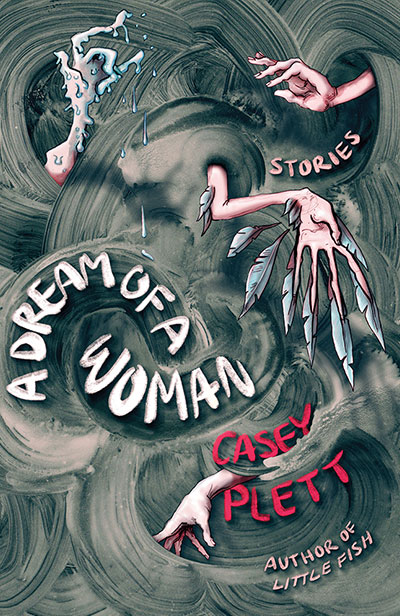
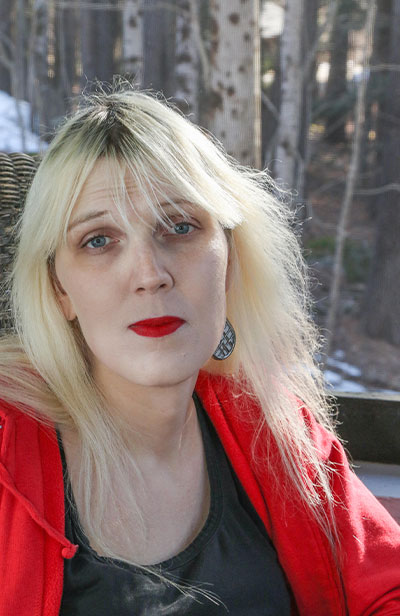
Casey Plett is the author of the novel Little Fish (Arsenal Pulp Press), winner of the Amazon Canada First Novel Award and a Lambda Literary Award, and the short story collection A Safe Girl to Love (Topside Press), also a Lambda Literary Award winner. She is also the co-editor of the anthology Meanwhile, Elsewhere: Science Fiction and Fantasy from Transgender Writers (Topside Press). She wrote a column on transitioning for McSweeney’s Internet Tendency and her essays and reviews have appeared in The New York Times, Maclean’s, The Walrus, Plenitude, the Winnipeg Free Press, and other publications. She is the winner of a Lambda Literary Award for Best Transgender Fiction and received an Honour of Distinction from The Writers’ Trust of Canada’s Dayne Ogilvie Prize for LGBTQ Emerging Writers. She lives in Windsor, Ontario.
Twitter: @caseyplett
Instagram: @plettsky
A Dream of a Woman by Casey Plett
She’s come to see a girl named Ava, a shy, tall beauty from St. Vital, who Gemma met when Ava was visiting the city in spring. Gemma has a good feeling about her.
Gemma has twenty-six dollars to her name. She is a professional drinker and a sloppy hooker, and she no longer has her room in the city, a big third floor on Langside. Her friends had offered her many favours, and as a result, Gemma now has very few friends. Gemma’s future is a black box to be pondered only days at a time, but right now, she has a good feeling about Ava—a feeling a girl either does something about or lets needle her until she dies. And Gemma needs somewhere to stay. And from all Gemma’s seen, Ava is generous, and Ava is kind.
The rideshare drops her off at First and Stephen. Gemma steps onto the shoulder, crunching on gravel, and then she leaves the road. A train’s horn sounds in the east; there’s a lull of cicadas. She ambles through still-wet prairie shortgrass with thin waves of skeeters rippling around her arms. The train’s horn sounds again, farther away.
Gemma crosses South Railway and gazes up at the tower of Ava’s building. When did they build this thing?
She enters to silence and cool air, waits between glass doors. The glass layers a faint triplicate of her image in front of her. She’s in a belted black cloth coat with a red dress underneath. Her hair is in pigtail buns, her eyeliner heavy and winged. She turns with her hands in the pockets of her coat, examining herself from each angle. A flattening gust of wind passes the building outside. Thank God it stopped raining. The whole ride down, Gemma had worried she’d get soaked. She wants to look perfect; she wants Ava to open the door and see a dream of a woman looking back at her.
The elevator dings. There she is: fox-faced and gorgeous, standing three miles high in a cream scoop neck blouse and a pleather skirt with zippers. She strides through the lobby with a warm smile. I forgot what you looked like, Gemma thinks idly. I forgot the shape of your face.
—
Excerpted from A DREAM OF A WOMAN. Copyright © 2021 by Casey Plett. Excerpted by permission of Arsenal Pulp Press. All rights reserved. No part of this excerpt may be reproduced or reprinted without permission in writing from the publisher.
The Octopus Has Three Hearts by Rachel Rose
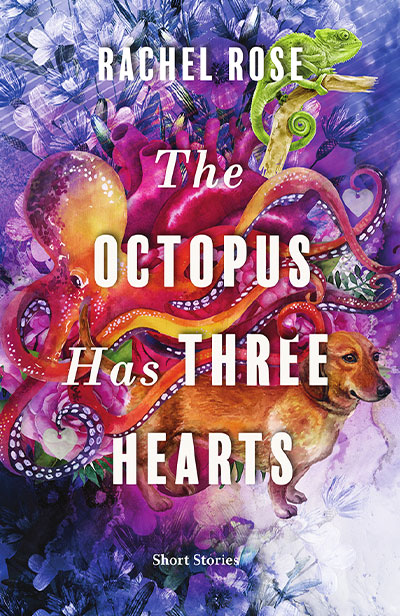
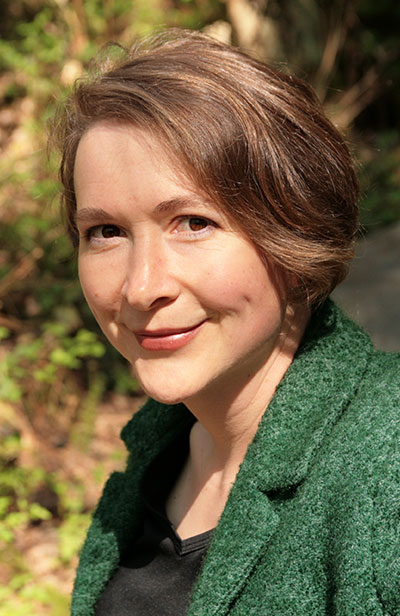
Rachel Rose is the author of four collections of poetry and a memoir, The Dog Lover Unit: Lessons in Courage from the World’s K9 Cops (St. Martin’s Press), which was shortlisted for the Arthur Ellis award for best non-fiction crime book in 2018. She is also the recipient of the Bronwen Wallace Award for fiction from The Writers’ Trust, the Pat Lowther Memorial Award, a 2014 and 2016 Pushcart Prize and a 2016 nomination for a Governor General’s Award. She is the Poet Laureate Emerita of Vancouver, poetry editor at Cascadia Magazine and a contributor for Maisonneuve Magazine. Rose’s work has appeared in numerous anthologies and publications including The Globe & Mail, American Poetry Review, Poetry, Malahat Review, Rattle, New Quarterly, Best Canadian Poetry, Monte Cristo Magazine and the Vancouver Sun. She lives in Vancouver, BC.
The Octopus Has Three Hearts by Rachel Rose
“Cigarette?” demanded the punk, getting right in my face as I walked past him with my mango smoothie. He was an angry white man with a face tattoo and a black rat on his shoulder. Half his face was inked to mimic a skull—black around his eye, a triangle on half his nose, teeth and gums in black ink around his jaw. A skull on top of a skull and piercings in the tats; it seemed so redundant that I grinned.
“Sorry, I don’t smoke.”
“Spare change?”
“Sorry, no change,” I said, patting my pockets, which was the truth. But sorry was obviously not what he wanted to hear, because as I walked by, the punk punched me in the stomach. The rat gripped him with its claws, swinging its tail for ballast and hanging on tight as the punk hit me.
I dropped my smoothie—mango slush all over the sidewalk—and doubled over. When I could stand up again, he was nearly out of sight, weaving around cars at something between a jog and a run. I held my stomach, trying to catch my breath, and then I carefully stood up and began to walk down the street.
I found it hard to walk. I was dizzy. That punch hurt so bad. I leaned against the wall next to the Starbucks. A mom was sitting at a table, nursing her toddler.
“Excuse me, are you okay?” she asked me. “He hit you pretty hard.”
I took my hand away so I could brace myself against the wall. “Oh my God!” said the mom. I looked down. Blood leaked through my T-shirt. The toddler pulled off the boob with a loud pop and stared. “Owie,” he said, pointing at me. Her nipple shot a fine spray of milk until she tucked it back in her blouse. I wobbled.
“Sit down. I think you got stabbed. I think he stabbed you!” said the mom, reaching for her phone. “Can I get some help here?” That’s all I remember. It was like staring into the sun. Everything went red after that.
I often thought about that punk and his rat in the long days and nights of my recovery. His knife pierced my large intestine, and I went septic. I had to have a length of bowel removed, and for six months after, I walked around tethered to a bag of my own shit. I lost over a hundred pounds. The police interviewed me, of course. They told me it might be too late to catch the punk. But that turned out not to be true, because he did the same thing to someone else, a dude this time. I thought we should meet up for support or commiseration, but the doctor said they couldn’t release the other victim’s name. I figured he was at the same hospital on the same floor that I was. That was kind of interesting. “Maybe he’s the one,” I told the night nurse, Rie. “Maybe we’ll meet and fall in love and have a wedding with his ’n hers colostomy bags.”
Rie patted my hand. “Be glad you are alive,” she said. “Focus on that right now.”
I was more ashamed to be wearing a colostomy bag than glad I was alive. I didn’t want to be discharged from the hospital at all, ever. But the doctors called me strong, and the doctors called me lucky (though if you ask me, that was debatable), and the plan to send me home was never challenged.
They encouraged me to join a victims’ support group. I did, but the result was the opposite of helpful for my situation. I learned that people are terrible to each other, especially if they are related, especially if they are men. I learned that there is a certain class of men who like nothing more than breaking the bones and teeth of whichever woman they happen to be fucking. This I knew, I suppose, but to see the result up close and personal was something I could have done without. I dropped out of the group and tried to pick up the pieces of my life. As the doctors constantly reminded me, I was lucky to be alive.
I am a fat girl, I should probably mention that, or I used to be before I got stabbed. My fat was my armour, and I have needed armour for sure. I’m now a fat girl trapped in a skinny girl’s body. That man stabbed right through my armour. I wasn’t on speaking terms with my parents, but my twin sister, Stephanie, came out to stay for a week right after I got discharged. She was shocked to see me so changed. “Piper, you look amazing!” she said, meaning not fat. “You look so beautiful.”
“Yeah, this was the best thing that ever could have happened to me,” I said, gesturing to my bag of shit.
Stephanie hugged me. “Not the best thing, but maybe a blessing in disguise,” she said. She meant well. I tried to swallow the sarcastic words, because the fact was she had taken her vacation days to come and help me clean my little stoma, to drive me to physical therapy, to watch Friends on an endless loop, to bring me meals on a tray. My twin. We used to be so close, before the incident that happened when I was eleven, the one she doesn’t like me to talk about.
“Dad and Mom are great,” she said, though I had purposely not asked. “Mom’s diabetes is under control. Neither of them exercises. Uncle Eddie and Aunt Donna are going on a cruise with them. Yuri and I are thinking of joining them, though I’m not sure if it will be fun. The problem with a cruise is you can’t get off.”
Having nothing to say, I said nothing. “What do you think, Piper? A cruise to Jamaica! Yuri thinks we should go, since Uncle Eddie’s paying. I wish you’d come for once.” Uncle Eddie is Mom’s twin. Twins run in the family. So does silence.
Before the stabbing, I played poker online, successfully enough that my earnings ranged in the low six figures, and I could eat all I wanted with nobody judging me. I didn’t have to leave the house, and usually didn’t care to, except for between four and five in the morning when my fellow humans were all asleep and the sky was just growing pink. So that’s what I returned to once I was discharged. I took my shit bag for a walk at this hour and tried not to think much beyond the next crack in the sidewalk. After a time, the doctors tucked my newly shortened bowel back in my body, sewed up my stoma, that little shit-mouth in my side, and told me I was free to live a normal life.
Even after my stoma was repaired, I kept up the habit of walking when the streets were clear of men. It was just easier that way. I wished there were some kind of city ordinance: women-only streets from four to six a.m., but I lived alone and could make my own schedule. I carried five rolls of quarters rolled in a sock. I can give quarters if someone asks me nicely or I can defend myself, depending on the situation. If you say I have been changed by the stabbing you’d be right. If you say I’ve lost my trust in people, you’d also be right. Every morning was the end of my night. I’d get a Big Mac from the twenty-four-hour McDonald’s and walk slowly around my gentrifying neighbourhood, appreciating my gut’s ability to digest each bite.
And so it was that I saw him one morning, slumped against a wall by a bank that didn’t open for another four hours. Again my first thought was What kind of idiot tattoos half their face with a skull? He looked both satanic and unfinished. He had nodded off at a weird angle, slumped backward instead of forward, the back of his head resting on a bike rack so he looked, for a moment, dead. But I watched and saw his chest slowly rising, slowly falling.
Something was squirming under his hoodie. I jumped back just as a pointed whiskery nose popped out from one sleeve. I didn’t scream. Fact: If you don’t scream when someone randomly stabs you with a knife, you are probably not a screamer. The rat twitched its black nose at me. From his pocket appeared another rat, just the brown head at first, and then the whole creature.
My stabber didn’t move. I made a great decision without thinking it through. I held out a piece of burger to the rats. All animals like meat when they can get it. Rabbits, rats, birds—they’ll go for the protein if they get half a chance. I gave my stabber’s rats a bite of Mickey D’s and they came home to Mama. They climbed from him to me like they were leaving the proverbial sinking ship. Stinking trip was more accurate.
And then an impulse rose, not in my mind, but in my hands. I had opened a pocket for the rats and felt my sock full of quarters. Rats went in, sock came out. I felt its heft in my hand, looked around and slammed the punk across the face with the sock. I heard the snap of his nose breaking. His eyelids fluttered before he went under. My heart was beating fast, but I was entirely unafraid of him. Had he woken up and tried to attack me, I would have done him bad harm. I know that with absolute clarity. But since he slept on, I took his rats and broke his face. I hope his skull tattoo never lined up right again. I hope I left my own fucking mark.
—
Excerpted from THE OCTOPUS HAS THREE HEARTS. Copyright © 2021 by Rachel Rose. Excerpted by permission of Douglas & McIntyre. All rights reserved. No part of this excerpt may be reproduced or reprinted without permission in writing from the publisher.
Swimming Back to Trout River by Linda Rui Feng
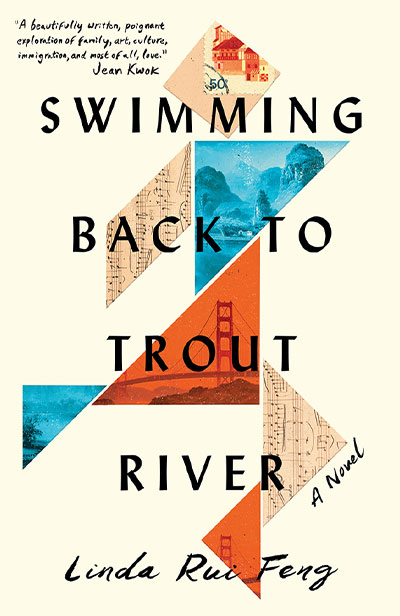
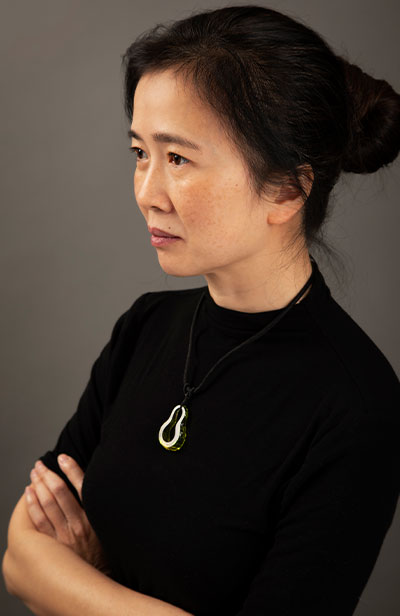
Born in Shanghai, Linda Rui Feng has lived in San Francisco, New York, and Toronto. She is a graduate of Harvard and Columbia Universities and is currently a professor of Chinese cultural history at the University of Toronto. She has been twice awarded a MacDowell Fellowship for her fiction, and her prose and poetry have appeared in journals such as The Fiddlehead, Kenyon Review Online, Santa Monica Review, and Washington Square Review. Swimming Back to Trout River is her first novel.
Instagram: @lindaruifeng
Website: LindaRuiFeng.com
Swimming Back to Trout River by Linda Rui Feng
The train that was delivering Junie to Trout River was just pulling out of the station and gathering speed, and already the compartment was filling up with cigarette smoke and the gregarious sound of sunflower seeds being cracked open. This was 1981, when trips traversing the length of China took days, and the passengers, having waited for that first lurch of the train, now sprang into action. They poured each other hot water for tea from a communal thermos stabilized inside a metal ring beneath the window where Junie sat on the lap of her mother, Cassia.
Cassia too was set into motion in her own way. She began to tell Junie over and over again to listen to her grandparents, as if some urgent and collaborative task awaited them at the end of the journey. The cadence of that litany—listen to them, they know what’s good for you—merged with the rhythmic rattle of the train until the two sounds became indistinguishable. To Junie, who was five and wasn’t otherwise prone to premonitions of loss, it seemed as though something unprecedented was about to happen, and it made her almost afraid, until the scenery outside the window began to change. Junie had never seen so many dewy rivers and paddies, or so many trembling shades of green, and they exerted a tug on her that the snowy landscapes of her birthplace had never done.
Throughout their trip, passengers in adjacent bunks, noticing Junie’s empty trouser legs, asked Cassia about them, believing themselves to be striking up a conversation with a somber woman who needed company. But Cassia pretended not to hear them, and after this happened a couple of times, no one asked again.
She knew that if her husband Momo were here, he would never ignore these proddings. He always educated his inquisitors, sometimes even chided them in outbursts, saying something like, Many forms of human locomotion are possible.
Momo was a believer in possibilities. That was the best thing about him, but also the worst.
Earlier that year, Momo left for graduate school in America, and it was understood that in a year or two Cassia would follow. The night before his departure, he managed to borrow a violin that someone, somewhere, had made into a size that fit a child’s fingers.
It seemed to Cassia that an absurd amount of craft went into making such a miniature instrument—something that even for adults was a luxury, and even contraband not long ago, during the Cultural Revolution. The fact that it was made in the first place presumed a kind of child prodigy who would, against all odds, make all this arcane skill worthwhile.
But Momo didn’t think it absurd, and his impending absence from Junie only made him more determined to start her on music—not just any kind of music, but the kind that had shaped him in his university years in a way Cassia didn’t fully understand. In the wee hours of the morning before his departure, he insisted on giving Junie a last-minute violin lesson. After some cajoling and a tussle, it ended in a tantrum and tears. Cassia thought his desperation pitiable—what had he been thinking ? But she also knew she could never match his aspirations for their daughter, who was born with nothing below her knees—no tibias, no feet. Where her legs ended, the skin was smooth and the shapes perfectly rounded and unapologetic.
But Cassia rarely touched her there.
Unlike Momo, right now, she was determined to accomplish something very practical: to deliver Junie into the hands of her in-laws, to ensconce Junie in Trout River where Momo had grown up, and to make herself dispensable as a guardian. Whatever Junie would become—and Cassia could not fathom it any more than she could her own future—it had to start with this.
Outside the rattling train compartment, the gleaming railroad tracks merged and separated like undulating steel snakes. She pressed her mouth close to Junie’s ear, as if she was sharing a conspiracy with her: “Remember that time when your dad was little and Grandma thought a tiger snatched him up?”
Junie’s eyes lit up with laughter, as if she’d been reminded of a successful stunt pulled off by someone her age.
“Don’t laugh,” Cassia said. “Promise to never make your grandparents worried like that.”
Before they boarded the train, Cassia had scraped her memory for tidbits from Momo’s boyhood—things they’d talked about during their courtship and the early years of marriage. She was planning to impart these tidbits to Junie, through repetition and review, to allow for a seamless transition into this new ecosystem and new life.
She knew she had a lot to compete with—the scenery outside, the chatter and laughter of strangers inside. Over the rest of the journey, she began to take more liberties with the stories, until they became expansive like a rustic saga. It now involved not just tigers (too remote and menacing) but also sparrows (which he caught during the lean years), plus a river turtle that he befriended (to show Junie that not all animals were food).
It was the closest Cassia had felt to Momo in a long time. After all, wasn’t it true that to love someone is to figure out how to tell yourself their story? She could almost see him in his prepubescence, running through the feral paths and brimming with vitality that had no place to go. When she imagined him like this, unformed and far from invincible, it was much easier to forgive him for his absurd optimism.
As the train trundled south and crossed first the Yellow River, then the Yangtze, and eventually entered the long mountain tunnel toward Trout River, Cassia even thought that this was how the two of them might start over, if starting over was still possible.
On the day that Cassia was to return up north without Junie, she took a walk over a stone bridge with Junie riding on her back. It was autumn, and underneath them, the river that gave the small town its name gurgled with shifting pitches and rhythms in a way that Junie thought resembled singing. She shook Cassia’s shoulder to point this out, but Cassia did not seem to relish the river, or anything at all.
Cassia stood out against the fluid movements and chatter of Junie’s grandparents, more like a dam than a rampart. Junie could see that something about Cassia made her not belong in Trout River. But the way the world was laid out here amid the water and leaves made sense to Junie in a way that life with Momo and Cassia did not—for example, how Cassia was always worried about something they couldn’t see. Or the way Momo pressed Junie’s fingers down on the cold violin strings even though she told him it hurt—and the way he got angry when she fought off The Violin Monster and broke it by accident.
For the time being—this was what the adults all said about her being here, but Junie didn’t think that this was a temporary arrangement. She heard this in Cassia’s tone, in the urgency and finality of her admonition: They know what’s good for you.
Junie did not cry when they said good-bye to Cassia. That night when she began life with her grandparents, Junie watched Grandpa wash his feet before going to bed. For most of his life, Grandpa had been a carpenter and tinkerer, though only his age, and not his occupation, was evident from his submerged feet.
Junie scooted over toward him on her knees, reached into the well-worn tub where his feet were planted, and poked at the gnarled sinews and bones in them.
“Your legs grew roots, Grandpa,” Junie said, “like those trees by the river!”
He looked at her, then down at his own feet.
“Do you think my legs will grow roots like yours, when I’m older?”
Grandpa now looked over at Grandma, and the look they exchanged was one passed between long-married couples that allowed them to synchronize backstories and action plans. Grandma shuffled over to scoop up Junie from the floor. She plopped her down onto her knees.
“It doesn’t work like that,” she told Junie, but the question seemed to have put her in a pensive, though cheerful, mood. As Grandpa dried his feet, she told Junie that the universe was full of transformations, some of which we could see, but most of which we couldn’t. She said that the philosopher-poets from ages ago talked about zaohua, the Fashioner of Creatures, the Shaping Mutator, the unseen forces that turned animals into plants, minerals into animals, and people into anything imaginable. These metamorphoses were more creative than we can put names to, because they erased forms but invented new ones too.
Yes, Grandma answered, the philosopher-poets thought that a person could turn into a cricket’s arm.
—
Excerpted from SWIMMING BACK TO TROUT RIVER. Copyright © 2021 by Linda Rui Feng. Excerpted by permission of Simon and Schuster. All rights reserved. No part of this excerpt may be reproduced or reprinted without permission in writing from the publisher.
The Listeners by Jordan Tannahill
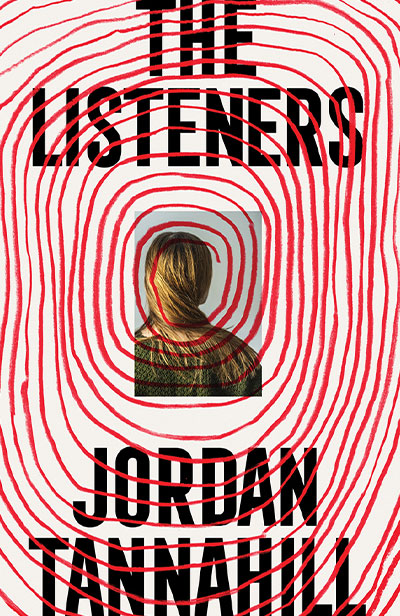
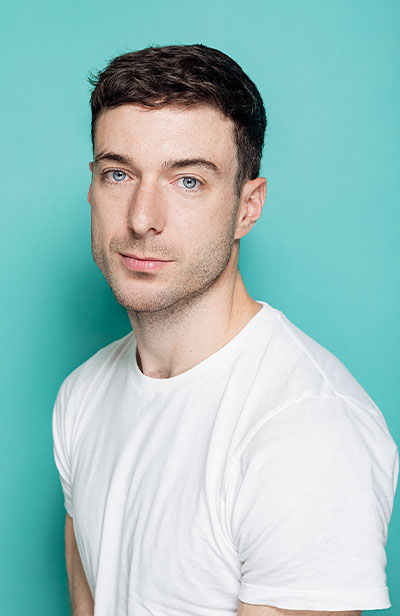
JORDAN TANNAHILL is an internationally acclaimed playwright who was born in Ottawa and is currently based in London (UK). Two of his plays have won a Governor General’s Literary Award for Drama. He has written one previous novel, Liminal, which was published to much acclaim and named one of the best Canadian novels of 2018 by CBC Books. CBC Arts named him as “one of sixty-nine LGBTQ Canadians, living or deceased, who has shaped the country’s history.” He is a regular columnist on CBC Radio’s The Next Chapter.
Website: www.jordantannahill.com
Twitter: @cruising_utopia
Jury Citation
The Listeners is at once a revery for the sublime, for the innocuous tapestry of sounds that make up the rhythms of our lives—and the pollution of sounds that can tear and devour. It is at once a masterful interrogation of the body, as well as the desperate violence that undergirds our lives in the era of social media, conspiracies, isolation, and environmental degradation. Tannahill writes as both poet and playwright, millennial and philosopher, as one who trains his reader to attune to the frequency of ‘the Hum’ to experience a rich hinterland beyond our embodied senses, beyond our perceptions of grace or faith. I leave listening, even to the silences, which are always screaming, and posit myself in my cochlea, forever now a conch, flaring and reeling, primordially.
The Listeners by Jordan Tannahill
THE CHANCES ARE THAT YOU HAVE, AT SOME POINT, stumbled upon the viral meme of me screaming naked in front of a bank of news cameras; a moment of sheer abandon forever rendered as a GIF, pasted in comment threads and text messages the world over. The chances are that you have also seen the cov- erage of the tragic events that unfolded thereafter on Sequoia Crescent. And the chances are that you probably think of me as some brainwashed cultist, or conspiracy theorist. I wouldn’t blame you for believing these things, or any of the other wildly sensationalized stories that have circulated in the days, weeks, and months since.
The truth is that I am a mother, and a wife, and a former high school English teacher who now teaches ESL night classes at the library near my house. I love my family fiercely. My daughter, Ashley, is the most important person in my life. You read about parents disowning their transgender sons, or refusing to speak to their daughters for marrying a Jew, or not marrying a Jew, and I think—well that’s just barbarism. Faith is basically a mental ill- ness if it makes you do something so divorced from your natural instincts as a parent. I remember holding Ashley when she was about forty-five seconds old, before she had even opened her eyes, when she was just this slimy little mole-thing, nearly a month pre- mature, and I remember thinking I would literally commit murder for this creature. As I held her I imagined all of the joy and plea- sure she would feel, all of the pain that I would not and could not protect her from, and it completely overwhelmed me. I imagined the men who would hurt her one day, and I imagined castrating them one by one with my bare hands. All of this before she was a minute old! So no, I have never understood how anyone could ever put any creed or ideology before their love of their child—and yet, this is precisely what Ashley accused me of doing in the year lead- ing up to the events on Sequoia Crescent.
I have attempted to recreate the events in this book as faithfully as my subjective experience of them will allow. I wrote these words myself. I did not have a ghost writer. I did not write this book to cash in on whatever minor and temporary notoriety I might have accrued, or to somehow exonerate myself. I wrote it as a way of making sense of my circumstances.
I have always turned to books for this. I’ve been a voracious reader since I was a girl. I was raised by a single mother and a television. There were no books in our apartment growing up, so I would take out as many as I was allowed from the library, and sometimes a few more which weren’t returned. I’ve always been drawn to stories of women pushed to the brink, living through extraordinary times, and enduring remarkable hardship. I have no time for stories about people mired in self-pity or self-destruction, who flounder around helplessly and hopelessly, I mean who cares, just get on with it. Even though my life really goes down the shitter in this one, I hope that you’ll take me at my word when I say that I truly fought every second of the way, and I did not, and still do not, see myself as a victim. In fact, I’m sure many people see me as a villain in this story, but I try not to see myself as that either.
In high school, I was an aspiring essayist in the mould of Joan Didion. I had visions of postgraduate nomadism, smoking half a pack a day and driving my way across America, stumbling into the eye of the zeitgeist with my notebook and pen in hand. I used to wear a big army jacket with deep pockets stuffed with dog-eared copies of Rimbaud and Pound. All I wanted back then was to see my name in print. That was before I got pregnant at twenty-two, married Paul, and enrolled in teacher’s college. I never harboured regrets, though. I enjoyed being a young mom. When Ashley was growing up, we used to finish each other’s sentences. People would joke we were telepathic, and sometimes I half believed we were. I’d be thirsty and she’d bring me a glass of juice. Or I’d wake up knowing that she’d had a nightmare and walk into her bedroom before she even cried out for me.
All that to say, I never expected I would wind up writing a book after all these years, and certainly not under these circumstances. It just got to the point where I couldn’t bear to hear another person’s take on my story, another pundit or talk-show host weighing in on the events of Sequoia Crescent like they knew a damn thing about it, or making light of the tragedy for a late-night-show laugh. And trust me, I can take a joke. I’m sure I laughed harder than most of you at my frazzled hair and flopping boobs in that meme. But if you want to know the full truth, that requires digging deeper than an easy punchline.
The thing I still struggle to wrap my head around is how did something so small, so innocuous precipitate the complete unravel- ling of my life. How all of this soul-searching, transcendence, and devastation could begin with a low and barely perceptible sound.
Do you hear that?
I was lying beside Paul in bed. He was reading the New York Times on his tablet, and I was marking student essays on Twelfth Night.
Hear what? he asked, still reading his article.
I put the essay down on the comforter. It’s like a—humming, I said. Paul looked up, and we both listened for a moment.
A humming?
Like a very low hum, I said. He frowned, shrugged, and returned to his tablet.
I don’t hear it.
I picked up the essay and tried to get back into it. After a minute or so, Paul asked me if I enjoyed myself at dinner. I nodded, non- committally. The evening was supposed to be just another monthly meeting of my all-women’s dystopia book club, but it turned into me cooking an overly involved tagine to celebrate Nadia’s birth- day—and then husbands were invited. Paul pointed out, rightly, that this was just my way. He was drafted into the role of sous-chef for the evening, bless him. The nine of us spent most of the dinner talking about Trump, and the Mueller report, which then mutated into an intense and wide-ranging discussion about ethics and faith which had half the table speaking animatedly, and the other half in silence.
Paul turned his head on the pillow, and said, You know, I wasn’t totally comfortable with you calling us atheists.
It took me a moment to realize what he was talking about. I looked up from my essay. I’m sorry?
At dinner. You said we didn’t believe in God.
What else could I’ve said? Tara asked me point-blank.
Well I would say that, maybe, I actually do, he replied. Paul held my gaze until I laughed.
Which god?
What do you mean—? Like Jesus Christ?
Paul looked at me like I was an idiot. Yes, he said. And his dad?
I studied Paul’s face, wondering if this was all a set-up for one of his laboured jokes. He then told me that ever since his father died in the fall, he had found himself thinking about faith.
Well not just thinking about it, but— But—?
Praying. Praying? When?
In my head, in the car sometimes.
He told me that he found being back in the church for the funeral strangely comforting, and that it stirred something in him. He said he knew I would diminish it, which was exactly why he hadn’t told me, and I said no, I wasn’t diminishing it, as I tried to compose my face. He said that he’d been considering trying to find a church in our area that he could try visiting, even just once a month or something. That’s when I figured this was probably a test and that he was baiting me, perhaps because he was still a bit drunk and wanted to square some argument from earlier in the evening, but I certainly wasn’t going to bite. I just opened my eyes wide and nodded. He then reminded me, as if I need reminding, that Cass and Aldo are Evangelical.
So?
So, you were quite rude about it. I wasn’t.
Yes, you were. You were being forceful and dismissive.
Well I certainly didn’t mean to be, and if Cass thought so, she can tell me herself tomorrow.
I was hoping that was the end of it, but I could tell it was still working on Paul as he lay there, staring up at the ceiling. For such a giant man, he could be like a little boy when he stewed on something.
I actually think I’ve buried this part of myself for years because of you, and now I—
Oh please.
—no I do, because of your atheism, but I think if left to my own devices my tendency might actually be towards faith.
Left to your own devices your tendency is also towards micro- wave dinners and The Wire on Netflix.
He turned his head towards me again and smiled, then reached over and gently pushed my face with his big paw.
If you want to start going to church, you can knock yourself out, I said. But leave me out of it.
I never suggested otherwise, he replied.
Paul knew better than to talk to me about God. I had invested twenty long years in un-fucking his head with that stuff. I’d seen what the church had done to people like his mother, and there was no way I was going to live a small, mean life under the thumb of the patriarchy. My feeling on the matter was: I had my shit together, I didn’t need God. That’s pretty much how I’ve felt since I was sixteen, when it suddenly struck me that God was no differ- ent than every other guy in my high school; he wasn’t interested in me unless I was down on my knees.
—
Excerpted from THE LISTENERS by Jordan Tannahill. Copyright © 2021. Excerpted by permission of HarperCollins Publishers Ltd. All rights reserved. No part of this excerpt may be reproduced or reprinted without permission in writing from the publisher.
Em by Kim Thúy, translated by Shiela Fischman
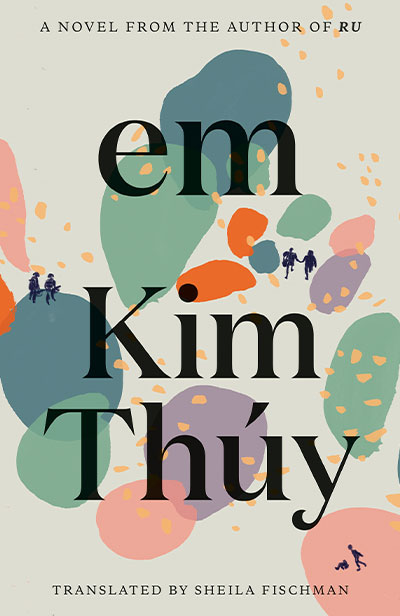
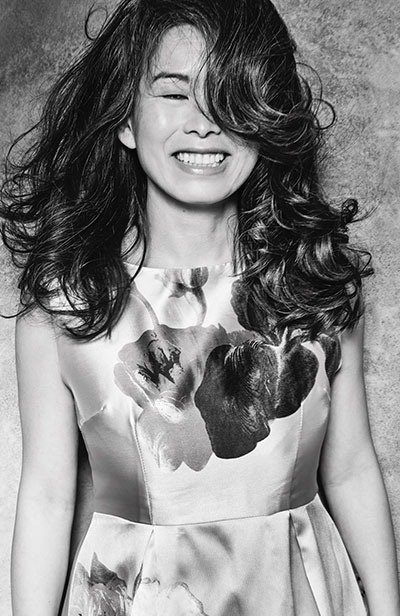
Born in Saigon in 1968, KIM THÚY left Vietnam with the boat people at the age of ten and settled with her family in Quebec. A graduate in translation and law, she has worked as a seamstress, interpreter, lawyer, restaurant owner, media personality and television host. She lives in Montreal and devotes herself to writing.
Kim Thúy has received many awards, including the Governor General’s Literary Award in 2010, and was one of the top 4 finalists of the Alternative Nobel Prize in 2018. Her books have sold more than 850,000 copies around the world and have been translated into 29 languages and distributed across 40 countries and territories.
Facebook: @KimThuyAuteure
Instagram: @kimthuylythanh
Website: www.kimthuy.ca
SHEILA FISCHMAN is the award-winning translator of some 200 contemporary novels from Quebec. In 2008, she was awarded the Molson Prize in the Arts. She is a Member of the Order of Canada and a chevalier of the Ordre national du Québec. She lives in Montreal.
Em by Kim Thúy, translated by Sheila Fischman
War, again. In every conflict zone, good steals in and edges its way right into the cracks of evil. Treason complements heroism, love flirts with abandonment. The enemies advance towards one another, all with the same goal: to triumph. In this shared exercise, what is human shows itself to be at once strong, mad, cowardly, great, crude, innocent, ignorant, devout, cruel, courageous . . . That is the reason for war. Again.
I’m going to tell you the truth, some true stories at least, but only partially, incompletely, more or less. Because it’s impossible for me to re-create the blue nuances in the sky just as Rob, the marine, was reading a letter from his lover, while at the same time the rebel, Vinh, was writing to his own love during a brief lull, a moment of deceptive calm. Was it a Mayan and azure blue, or a French and cerulean blue? When Private John discovered the list of insurgents hidden in a pot of manioc flour, how many kilos were there? Had the flour just been milled? What was the temperature of the water when Monsieur Út was thrown into the well before being burned alive by Sergeant Peter’s flame-thrower? Did Monsieur Út weigh half as much as Peter, or two-thirds? Was it the itching of his mosquito bites that so unsettled Peter?
For nights at a time, I tried to imagine Travis’s walk, Hoa’s shyness, Nick’s fear, Tuân’s despair, the bullet wounds of some and the victories of others in the forest, in the city, in the rain, in the mud. Every night, to the rhythm of ice cubes dropping into their container in the freezer, my research assaulted me with the knowledge that my imagination would never be able to grasp the whole reality. In one testimony, a soldier remembers seeing the enemy running full speed towards a tank carrying on his shoulder an M67 rifle, 1.3 metres long and weighing seventeen kilos. Facing that soldier was a man ready to die in order to kill his enemies, ready to kill while dying, ready to let death triumph. How to imagine such selflessness, such unconditional commitment to a cause?
How to contemplate that a woman might carry her two small children into the jungle over hundreds of kilometres, tying the first to a branch in order to protect him from wild animals while she moved off with the second, tied him up in turn, and went back to the first child to repeat the journey with him? Yet this woman described her trek to me in her ninety-two-year-old combatant’s voice. Despite our six hours of conversation, there are still a thousand details I lack. I forgot to ask her where she got the ropes, and if her sons still bear marks on their bodies from being tied up. Who knows if these memories have not been erased to leave behind only one, the taste of wild tubers she chewed into mush to feed to her
children? Who knows . . .
If your heart shudders on reading these stories of foreseeable madness, unimagined love, or everyday heroism, know that the whole truth would very probably have provoked in you either respiratory failure or euphoria. In this book, truth is fragmented, incomplete, unfinished, in both time and space. Then is it still the truth? I’ll let you reply in a way that relates to your own story, your own truth. Meanwhile, I promise you in the words that follow a certain ordering of the emotions, along with feelings whose disarray cannot be denied.
—
Excerpted from EM. Copyright © 2021 by Kim Thúy. Excerpted by permission of Random House Canada. All rights reserved. No part of this excerpt may be reproduced or reprinted without permission in writing from the publisher.
Fight Night by Miriam Toews
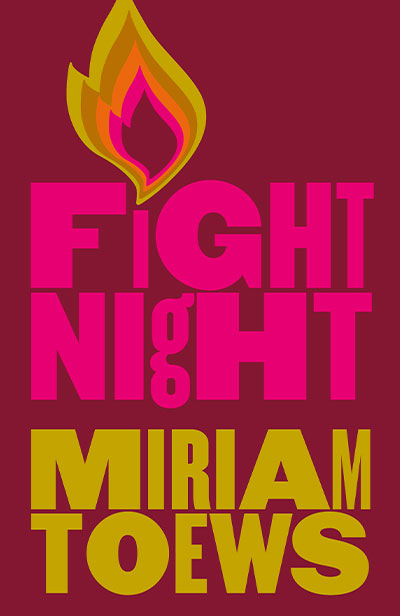
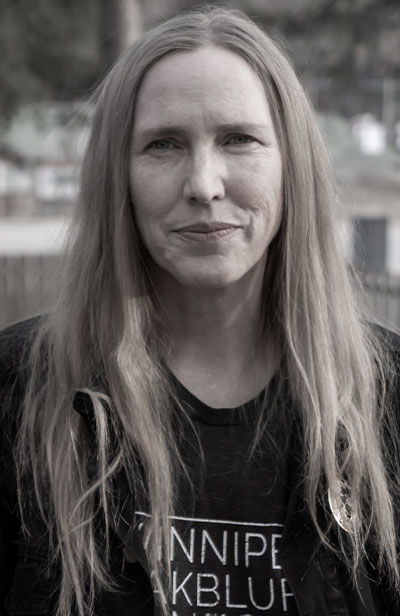
MIRIAM TOEWS is the author of seven previous, bestselling novels: Women Talking, All My Puny Sorrows, The Flying Troutmans, Irma Voth, A Complicated Kindness, A Boy of Good Breeding, and Summer of My Amazing Luck, and one work of non-fiction, Swing Low: A Life. Her books have been widely published internationally, and adapted for stage and film. Among other honours, she is the winner of the Governor General’s Literary Award for Fiction, the Libris Award for Fiction Book of the Year, the Writers’ Trust Fiction Prize, and the Writers’ Trust Marian Engel/ Timothy Findley Award. She lives in Toronto.
Jury Citation
Miriam Toews’ compellingly crafted Fight Night is a testament to her astounding grasp of narrative voice. The emotional range exemplified on every page solidifies Toews as one of our most endearing, compassionate and prolific storytellers. Her young protagonist, nine year old Swiv, is expertly rendered with exacting grit and enviable humour. To read this examination of girlhood, family and mental wellness, is to become wholly enamoured with a cast of characters consistently demonstrating the power of exuberance and resiliency of love.
Fight Night by Miriam Toews
Today marks the beginning of our neo-realist period, Grandma told me this morning. She plunked down fried potatoes on the table, and a bottle of ketchup. Fun and games! she said. She told me I have blue Nike swooshes under my eyes. She said I need to get more sleep. What’s the problem, Swiv? Bad dreams?
Grandma’s writing a letter to Gord, because that’s the assignment I gave her and Mom at our Editorial Meeting yesterday. She gives me assignments, too. We are co-editors. Our family therapist was the one who told us to write letters, but Mom says we can’t afford therapy anymore if all we’re supposed to do is write to missing people. Grandma says she thinks it’s useful. She says we can be like reporters and have our own news desk. She says letters start off as one thing and become another thing. But Mom mistrusts them, like photos. She hates photos. I don’t want to be frozen in a moment!
Grandma says fragments are the only truth. Fragments of what? I asked her. Exactly! she said. She asked me what my dream was last night. I told her I dreamt that I had to write a goodbye letter using the words one and blue. Na oba! Grandma said. That’ll be your assignment for today, Swivchen! She has a secret language. She didn’t even ask me who the letter was for. Grandma skips over pertinent details because she’s got five minutes left to live and doesn’t want to waste it on the small picture. What if I had a dream that I was naked and locked out of my house? I asked her. Would that be my assignment? Na jungas! she said. It’s happened to me many times! Grandma loves to talk about the body. She loves everything about the body, every nook and cranny. How can it have happened to you many times? I asked her. That’s life! she said. You gotta love yourself, regardless. That’s not life, I said. Being naked and locked out of your house all the time? Fun and games! she said. She was counting out her pills and laughing.
After that we had Math Class. Pencils ready! she yelled. If you’ve got a two thousand-piece puzzle of an Amish farm and you manage to add three pieces to the puzzle per day, how many more days will you need to stay alive to get it done? Math Class was interrupted by the doorbell. Ball Game! yelled Grandma. Who could it be? The doorbell ringer is set to “Take Me Out to the Ball Game,” which Grandma forces me to sing with her during the seventh-inning stretch even if we’re just watching the game in our living room. She makes me stand up for the anthem at the beginning, too. Mom doesn’t stand up for the anthem because Canada is a lie and a crime scene. It was Jay Gatsby. He wants to tear our house down. I went to the door and opened it and told him, It’s yours for twenty million dollars.
He said, Listen, can I speak with your mother. You said the last time—
Twenty-five million dollars, I said.
Sorry, said Jay Gatsby, I’d like to speak with—
Thirty million dollars, capitalist, do you understand English? I slammed the door shut. Grandma said that was a bit overkill. He’s afraid of death, said Grandma. She said it like an insult. He’s lost his way! Jay Gatsby wants to tear down our house and build an underground doomsday-proof luxury vault. Jay Gatsby bought a house on a tropical island once and then forced every other person living on the island to sell their house to him so
that he had the whole island to himself to do ecstasy and yoga with ex-models. He forced all the models to take pills that made their shit gold and sparkly. Mom said he’s had fake muscles put into his calves. She knows this because one day she saw him on the sidewalk outside the bookstore and his calves were super skinny and three days later they were bulging and had seams on them. Mom said he went to a place in Cleveland, Ohio to get it done where you can also have your vag tightened up if you feel like it. Then you can just sit around with your S.O. vaping all day with your giant fake calves and stitched-up wazoo and be spied on by your modern thermostat which is a weapon of the state they just call “green” because of sales and Alexa and shit and practicing mindfulness hahahaha and just be really, really, really happy that you don’t have half a fucking brain between the two of you.
That’s how Mom talks. It’s probably not true. She lies. She hates words like modern and creative and sexuality and she hates acronyms. She hates almost everything. Grandma told me she doesn’t know how Mom was able to stop ranting long enough to get pregnant with Gord. She compared impregnating Mom to creeping up to the edge of an active volcano that you accidentally thought was inactive. She says Mom does the emotional work for the whole family, feeling everything ten times harder than is necessary so the rest of us can act normal. Grandma doesn’t believe in privacy and thinks everything private is hilarious because she was the youngest kid to be born into a family of fifteen people. Na oba! she’ll say when you’re in the bathroom. Look at you sitting all by yourself in this little room with your pants around your ankles, that’s priceless! Grandma’s dad forgot what all his kids were called and accidentally gave Grandma the same name as one of the older kids. Grandma’s mom used her as a form of birth control by putting Grandma next to her in bed for seven years. After seven years Grandma’s mom entered menopause so she was safe, and Grandma could go sleep for the rest of her childhood in the hallway.
—
Excerpted from FIGHT NIGHT by Miriam Toews. Copyright © 2021 by Miriam Toews. Excerpted by permission of Knopf Canada. All rights reserved. No part of this excerpt may be reproduced or reprinted without permission in writing from the publisher.
The Strangers by Katherena Vermette
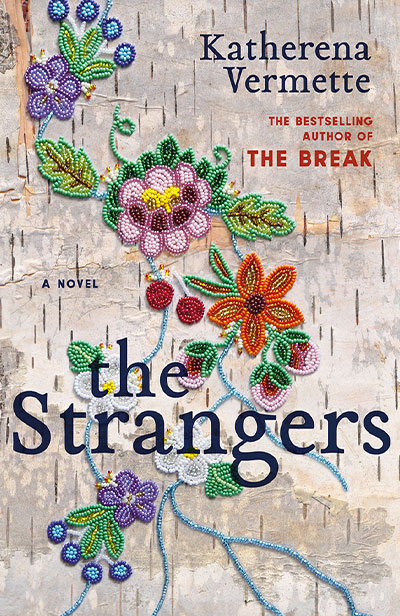
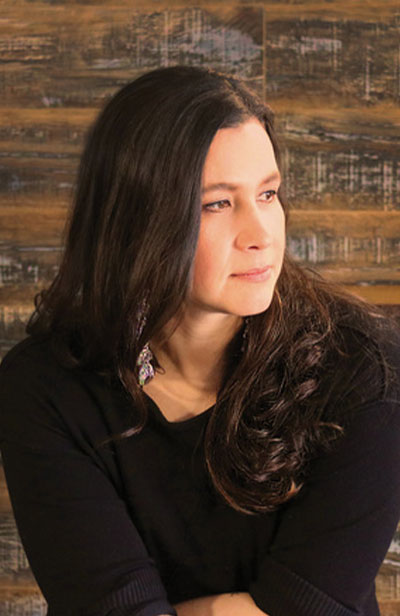
KATHERENA VERMETTE (she/her) is a Red River Métis (Michif) writer from Treaty 1 territory, the heart of the Métis nation—Winnipeg, Manitoba, Canada. Her first book, North End Love Songs, won the 2013 Governor General’s Literary Award for Poetry. Her first novel, The Break, was a national bestseller and won several 2017 awards, including the Amazon First Novel Award, Margaret Laurence Award for Fiction, Carol Shields Winnipeg Book Award, and McNally Robinson Book of the Year. She lives with her family in a cranky old house within skipping distance of the temperamental Red River. The Strangers is her second novel.
The Strangers by Katherena Vermette
“Can you believe it, Cedar-Sage?” Mama says. Her voice cracks so I can tell she’s not really as happy as she’s trying to seem. “You have a nephew! You’re an aunty!”
I don’t say anything, just push my annoying hair behind my ears and look down at my old leggings. There’s a small mustard stain by my knee because I’m such a slob. I pick at it and don’t look up. I want to be excited, but mostly I only feel sad. I pull the cuffs of my sweater down all awkward, pull them over my hands, and then remember to nod. Pretend I’m happy. For Mama. But I don’t look up. I don’t want to.
Mama sighs. Gets up and paces around the small room. I know what that means. She’s getting impatient with me.
“There’s no air in here,” Mama says. “Don’t they think to ventilate these rooms? We need air, for Christ’s sakes.”
She opens the old glass door and waves it back and forth like a fan. It does make a small breeze. The social worker sitting outside the door makes a face at the crazy woman waving the door around, but doesn’t say anything.
Mama’s been twitchy since she got here and now I know why. This big news. I wish I was excited about being an aunty, but really, what’s there to be excited about? Phoenix had a baby and it got taken away. Phoenix is in jail now. Phoenix did a horrible thing and is jail for a long time. She had a baby but it went to live with its other Grandma. No one will even tell us where that is, or anything other than his name.
A sad name.
Sparrow.
After our other sister. The little one. Who died.
“Well, I can’t wait to meet him. I bet he looks like my Grandpa Mac. All the boys in our family look like him. Your Uncle Alex is like his spitting image. Your Uncle Toby, too.” Mama does this every time we have a visit. Goes over family members I don’t even know. I have blurry memories of living in the brown house and an old Grandmère, Mama’s Grandma, my Great-Grandma, and another one, our actual Grandma who was named Margaret. I remember her a bit but only know her name ’cause Mama calls her.
“Babies are gifts, Cedar baby, gifts! Yeh, I can’t wait to meet him.” Mama paces around the room in that unnatural way she does and picks at a big sore on her lip. We only have another half-hour before the social worker will come get me and take me to my respite worker who will drive me back to my foster home. Foster place. Don’t know why they call them homes. Never had one that was like a home. This one’s better than the last one, I guess, but still. I got a room to myself, for the first time, and the lady there’s nice enough. Luzia is her name. She cooks a lot and talks to the TV like a crazy person, but there’s only one other girl there. Nevaeh. She’s a year older than me and acts all hard. Runs away a lot and stuff.
To be honest, I don’t know how to get excited about a baby I doubt I’ll ever get to meet. Another family member I’ll know about only ’cause someone told me about them. Named a sad name.
If I’m really honest, I’d admit I want to go now. Mama’s making me anxious and is probably going to get worse. She seemed fine when we got here, twitchy but put together enough for our first visit in almost a year. But now, who knows. She must be on something, or maybe hasn’t been on something in too long. I used to be able to tell which was which, but it’s been so long I don’t really know her moods anymore. Or her drugs.
“Cedar-Sage, Cedar baby, don’t get all attitude with me now. Just ’cause you’re a teenager now doesn’t mean you have to act like one. I need you to say something. I can’t, I can’t stand you just sitting there.”
Mama’s voice cracks over the words. She sits down across from me and nervously puts her hand on my knee. “I— I love you so much, my girl.”
I want to reach out and hug her but I wait for a minute, to be sure. I used to be really good at being what Mama wanted, needed. I was always happy when she wanted me to be. Talkative when she wanted to listen, quiet when she needed quiet. I was always that way. But can’t seem to do it this time. I did feel happy when I first got here. When I first saw her, I smiled so wide I felt like a goof. Was so glad to hug and feel her arms around me. I even had a bit of that crazy little kid hope I used to, that this would be the time, finally the time that they would tell us we could go home and Mama would take me to our real home to live. Then I felt how skinny she is, how sick and wrecked she looks. And I knew. Again. Just like so many of the things I want, or used to hope for, it was never going to happen.
When I finally look up, Mama is staring at the wall, all big eyed and stoned looking. She does that when she’s upset, goes far away.
“I love you, too, Mama.” My voice is small and rough. I was going to say more but she looks up too quickly, sucking on her cut lip like she’s trying to hide it. Like nothing is wrong at all. Then jumps up again.
“Okay? I’m just going to go grab a coffee.”
I don’t say anything. Don’t have to.
“Be right back, Cedar baby.” The door closes slowly behind her. Doors don’t slam here. They just close slow, as if with a sigh.
This is her third cup of coffee in the last hour. If Mama could, she’d go down and have a smoke too, but she can’t do that anymore. When we used to visit regularly, back when Sparrow was alive, the first Sparrow, Mama used to take lots of smoke breaks during visits. She said she needed them because the whole thing broke her heart so much, but they stopped all that a few years ago. For safety reasons. For everybody. So instead, she’s twitchy the whole time, needing a smoke, waiting to be able to go for one.
Maybe that’s the only thing that’s wrong with her, that she needs a smoke.
I know cigarettes are bad for people. I’ve seen so many videos at school about what happens when you smoke, a new one every year, complete with an assembly and a cancer survivor, or a cancer victim’s loved one, and a warning of how we can all die. They once showed an old man’s lungs all sick and black all the way through. That’s probably what Mama’s lungs look like now. Sick. All the way through.
But I also know there are things worse than cigarettes. They have assemblies about some of those too. They go over different drugs and warnings of how we could all die, like that’s the worst thing. They never seem to know the whole story. Only a small part. Not everything.
I sit there all quiet for a while, looking around the small room. I don’t like this one. It looks dirty and feels worse. The paint is chipped in the corners, and the chairs smell like sweat. The wooden arms all scratched up—someone knifed on mine: Rita was here 1992.
I always liked the big room down the hall better. It was cleaner. Had a couch, a TV, and a big painting of an eagle with its wings stretched out far and brown. That one’s for big families though, and now it’s only me and Mama.
We used to go in the big room when we first started coming here. Back when we were visiting regularly. When we were first in care, we’d visit every month. Back then, we were always so happy to see each other. It was like Christmas every time. Mama was in treatment and normal, and Phoenix was in a group home in West St. Paul. I remember missing and loving them both so much. Phoenix missed me too. She’d always give me a hug so big and so long I thought she’d never let me go. She’d hug me before she hugged anyone else. Even Sparrow who was so small she’d cling to my side for the first bit, unsure about Phoenix and Mama, as if they were strangers. Phoenix would tell us all about all the crazy kids she was living with at the group home, and before that, at the hotel. She always had lots of funny stories. Or made them funny by how she told them. Phoenix was always really good at that. Mama was usually pretty quiet. She’d go out for her smoke breaks and cry too much, but she was always calm and clean. In those days.
Now Phoenix is a mama, too. Well, she is but she isn’t. Her baby. This new Sparrow is not even going to know her. Is not going to know any of us. At least with me, I always knew my mama and remembered living with her. We all lived together for a long time. For Phoenix’s baby, it’s worse.
Or better.
The social worker pokes her head in the door and looks around. “Where’s your mom?” she asks, not really looking at me.
“Um, she went, for a coffee.” I stumble over the words. “I think.” I get so stupid and shy around other people, especially around new people.
Especially new mean-looking people like this one.
The social worker makes a noise like a huff and stomps off.
I sit and wait some more. Only twenty minutes left now. My respite worker will be downstairs soon, ready to take me back to Luzia’s. After that, I’ll have nothing to do but watch TV, or if there’s any chores that need to be done, I’ll clean something. I could read, but all my books are old already. I need to get to the library and take out some new ones. But no one will let me go alone. I have to ask the respite girl. Chelsea. She’s new, too. Just started this summer.
The door opens with a sigh as Mama comes back holding a new half-full styrofoam cup of coffee, bright with creamer. Her face looks sad again. The all the way sad. And the social worker follows her. Now I know something is up. Another something.
“Cedar, honey, we have some more news. It’s good news,” Mama says but doesn’t look it. “Your dad, remember we were talking about your dad last time?”
Last time was almost a year ago, months and months anyway, and my dad is just this other family member I don’t know but hear stories about. Your dad used to, you dad could be so, your dad would.
I don’t remember him at all. Hadn’t seen him since I was little, since before Sparrow was even born. I don’t know much life before Sparrow, but know everything about life with her, and after.
“Remember we were talking about you maybe going to live with him?”
This was another story she told but it wasn’t like I believed it. Not after a while. Mama has always said something about me going to live with my dad, maybe, if this, if that, when. When Sparrow was alive, I didn’t want to go because I thought that if I had to go to my dad then Sparrow had to go to hers, and I didn’t want Sparrow to have to be with her horrible dad. That or Sparrow would be alone at Tannis’s house, and I didn’t want that either. But it never happened anyway. It was just another story.
“Well, he got a pardon, and he’s, umm, he’s married now, so . . .”
The social worker cut in. “Cedar, your dad’s in a good place. He recently moved back here and petitioned to get custody of you. Everything’s gone through. What do you think about that, Cedar?”
I can’t even remember this social worker’s name. She’s new, too. Doesn’t matter anyway. It’s not like I have to say anything.
“They have a house, in Windsor Park. That’s in the south end of the city. A good neighbourhood. And his wife has a daughter your age, a bit older, I think. You have a stepsister, Cedar!”
Mama looks ready to cry but is trying to hide it. She looks ready to crawl inside her own skin and disappear, if she could. I know the feeling.
“I have to go? Now?”
The social worker laughs a bit, like I’m an idiot. “No, oh no, not right now. If you want, we can arrange a visit with them. Then maybe in a few weeks, before school starts, maybe, we can think about moving you there.”
I start picking on the mustard stain again. Luzia always puts too much mustard in her sandwiches. I thought I was sitting upright at lunch. Thought I leaned over my plate like I’m supposed to but sometimes I am such an effing slob. I pick at it until it’s almost gone, until it’s only a small faded yellow bit on the now-frayed fabric.
“I’m going to let you two talk about that a little more. It’s good news, Cedar. Best thing you could have hoped for.” The worker leaves and the door sighs a long sigh.
Mama wipes her eyes. She acts like it didn’t happen but I saw. I try to think of something good to say, but I don’t have to, Mama does.
“That social worker’s pretty uptight, hey?” Mama kind of laughs and slaps my leg, trying to be all happy again. As unpredictable as Mama is, I always like it best when she gets happy. “So, what do you think? You would be a south side girl, how about that?”
“Yeh,” I say, trying not to smile. Mama’s smiling sometimes makes me want to smile. Used to always.
“It’s a good thing, Cedar-Sage. Your dad is a good person.” Her voice light and smooth.
I frown but nod. Can’t look up.
“What? What is it, honey?” Mama’s hand still on my leg. Warm.
I think for a long time before I look at her, but then have to look away to say it. “What’s his— What’s his name?”
Mama is quiet so I look over, see the tears fill up in her eyes. The kind that stay there a minute before they fall down. I was pretty much near tears as it was anyway, but I always want to cry when I see my mama cry. Always.
No matter what.
The ride back is long and hot. It’s super hot today, like record-breaking hot, but I don’t take off my hoodie. Don’t even push up the sleeves.
Chelsea has an old car and the air conditioning is busted. That’s what she said, but it looks so old it might not have ever had air conditioning in the first place. We keep the windows rolled down all the way but it’s not that much cooler than keeping them shut, only more like sitting in front of a hair dryer.
Chelsea is pretty quiet after her usual “Hey, ready to go?” and I don’t feel like talking so we don’t say anything. She’s good like that. Doesn’t make me talk, only plugs her phone into the long cord and lets me pick the music. Just always looks to make sure I’m not doing anything else. You’re not allowed to go online when you’re in care, and I don’t have a phone. I only have an old iPod I got for Christmas last year. It was a hand-me-down from another foster parent. Foster person. She had filled it with One Direction songs because she thought that’s what I’d like. I did at the time. But now it’s too old to download anything new so that’s all I’ve got. Chelsea has so much and this is my new favourite thing to do. I scroll through all the names I want to know and pick the only one I’ve learned so far, A Tribe Called Red. I turn it on, lean back, and close my eyes, letting the hot air blow my hair around.
Saying goodbye to Mama is always the hardest part. We had to say goodbye with the social worker right there propping the door open. Mama cries and says sorry over and over.
“I’m so sorry, baby, oh my sweet baby. You are such a good girl.”
I squeeze her tight and try to ignore how bony she is. Try to ignore that stupid worker who checks her phone again. I breathe in her long, crazy hair and skin. I’m almost as tall as her now.
“I’m working so hard, Cedar baby. You’ve got to believe me. Please believe in me.” She pushes me off her and grabs my face in her sweaty palms. “Don’t get any teenage attitude and get yourself in trouble like your sister. Not you. You hear me?”
I nod frantically and try to smile. But Mama pulls me to her again.
“It’s so hard to dig yourself out once you get in the hole, you know?”
I can feel her hot breath through my hoodie. Can smell the Mama smell of her. Shampoo and something else. Something she always smells like. Something I always forget when I’m away from her too long. I run my hands over her hair. Her big curly hair that’s still wild but stringy-looking now, like it’s weighed down. Still beautiful like it’s always been, only thinner like the rest of her, and more grey. Like the rest of her. But it’s the same smell. Always.
“I’m going to try and go see that baby. I’m his Grandma too, you know. I should be able to see him, right?”
“Yeh” is all I say.
“I’m gonna see you again soon, too. Once you get settled. And don’t be afraid, honey. He’s family. Your dad is your family, too. I love you so much, Cedar baby.”
“I love you too, Mama.” She has a lot of grey strands in the front, and a few more lines around her eyes and that big cut on her lip, but she’s the same, really. Worse off, but still the same.
Mama pushes away one more time and cups her hand over her mouth like she’s trying to keep all her words from falling out. She looks at me for a long moment before she turns and walks away.
I watch her walk down the hall. Not knowing where she’s going. Or when I’ll see her again.
“Your respite worker is downstairs,” the social worker says. “Do you need anything before she takes you home?” It’s not like she cares.
I shake my head, and don’t look at her.
We stand there, like the worker is waiting for me to say something, but really she’s just waiting for Mama to be gone long enough so I can leave, too. Finally she says, “I’m going to set up that visit and let you know in the next couple days. Okay, Cedar?”
I still don’t look at her, just pull at my sleeves again and walk out. The same way Mama did.
The car goes down Main and turns on Selkirk. I know the way without looking. I open my eyes around Charles Street and look down to the corner of Flora Avenue. There’s an old grey house, behind a big old church, and Mama said she lived in the basement. She had pointed to it when we drove by this way, on the way to Sparrow’s funeral. She told me she’d take me there one day, for an overnight visit.
It never happened, but it made me hope for a while.
I always look for her there, at the grey house, when we pass this way. I’ve always lived around here. No matter where I’ve lived.
Selkirk Avenue goes on for a long time. The houses go from bigger and older to smaller but still old. Some look damaged. Some look perfect and painted. There’s another pretty big church, and a few new university buildings that stand out bright and shiny. One is painted in the four colours with a Tipi built into the side.
Next is Arlington. We had an apartment down Arlington once, but further down the street near Inkster. I was really small then, but remember it had a lot of stairs and a big window that looked out into the street. I used to sit there and watch the cars pass for a long time. Phoenix always made us toasted sandwiches. Phoenix was always really good at making food for me and Sparrow.
We turn on McPhillips, then to Burrows. Our first foster place, Tannis’s, was down Burrows. We lived there for a few years. Until. After that I went to stay in this place in the country, way down McPhillips. Down past the city where the open fields stretched out on either side of the road. It seemed to take forever the first time, but I got used to it. Even though I wasn’t there a year.
The songs change and the beats go slower as we pass the high school and move through the development where all the houses and apartments squish together in big buildings with so many windows. They all look the same but different colours. The brown siding of Jig Town, the Yellow Houses, the White Houses, and Lego Land. Called that ’cause it’s all the other colours, red, blue, and green. We lived in Lego Land for a while, too. That was my favourite but probably only ’cause I was young and we were all together for the last time. That place was big like a house and the windows were never shut. Mama likes to keep the windows open, no matter what season. She likes the fresh air. It was always so bright and clean, too. The long wall by the stairs was large cement bricks painted over white. I used to trace my finger along the in-between seams as I went up and down. Back then, before we went into care, Sparrow was a crazy, messy little kid, and Mama was there all the time. Back then, even Phoenix didn’t get into much trouble.
Our house was red on the outside and there was a park right behind. I used to think it was the biggest, best park ever, but I know now it’s not much of anything. Only a big open field with an old swing set in it. Still, it’s a really big field.
After Keewatin, the street starts to curve and rounds a man-made lake. The houses are newer. Further apart.
“You doing all right, Cedar?” Chelsea turns down the music but not all the way.
I nod back, and watch little kids roll their scooters down the sidewalk.
“You still want to go see a movie on Saturday?”
I nod again. And clear my throat as quietly as I can, knowing I should say something soon.
“You sure you don’t want to go to the beach or something? It’s so hot these days.” Chelsea tries but not hard.
“It’s air-conditioned in the theatre.”
“Very true.”
“And there’s Coke.”
“Also true.” She smiles as she turns the wheel. “You’ve got this all figured out, don’t you, kid?”
I smile. I like when Chelsea calls me kid. It’s not the most unusual nickname but it’s probably the best one I’ve ever had.
“Could we maybe, also, um, go the library?”
“Library? In the summertime?” Chelsea laughs. “For sure, kid. I’d be happy to take you to the library.”
Chelsea is okay. I hope she sticks around for a while. Respite workers seem to come and go pretty quick. Even faster than foster places. But Chelsea seems nice. And has great music.
I really miss my sister. My real one, the only one I have left. We used to talk on the phone every once in a while, back when she was at the Centre. She had phone privileges every other day. When I first came to Luzia’s, Phoenix would call after supper and Luzia let me talk for a while before I did the dishes. Phoenix even wrote me a letter once. It wasn’t much. A few pages of jokes she had heard that she thought I would like. She drew a little comic too, just to make me laugh. I still have it. Put it someplace safe.
I haven’t seen her in person since the funeral. I got to meet Mama at the office downtown and they drove us together, but Phoenix had to be escorted and came in with handcuffs and guards. They took off the cuffs but the guards stayed at the back watching us the whole time. As soon as she could, though, Phoenix came over and hugged me. After that she held my hand the whole time. Didn’t let go until she had to leave again.
That was almost two years ago. I can’t remember her face, not all the way. Or know how it must have changed. It must have gotten older-looking. Not kid-like anymore, like how I remember her best. Phoenix is seventeen now. Almost aged out. Or would have, if she didn’t go to jail.
I like my room here. The walls are clean and I don’t have to share. In the country, I had to share a room with one girl, and there were two other girls across the hall. Here there’s only Nevaeh and she’s way down the hall in her own room, too. My bed is straight and high and has a thick red wool blanket on it. The blanket is itchy on its own but I also got an under-blanket and a flat sheet. I don’t use all these things all the time, especially in the summer, but I always like to make them all together like that in the morning.
Luzia told me I was the cleanest girl she’s ever had. It’s a pretty big compliment, ’cause Luzia has had lots of girls. She’s fostered for years. Used to have as much as six kids at a time. But that was when her husband was still alive and they were younger, she had told me anyway.
I lie down on the bed and think about what I want to do. I don’t want to watch TV, or read, so I stare at the ceiling. I really hate summer when I have no homework or anything to do, but sometimes I like staring at ceilings and thinking. I like to think all the things I want to. Everything, everybody, like they are right here happening with me. Sometimes I canthink about them so well it doesn’t even hurt that none of them are with me anymore.
I think of Mama and Phoenix and imagine us all together somewhere in the country. Mama has always wanted to live in the country, where it gets super dark at night and you can actually see the stars. I like to imagine buying a big house and Phoenix getting out to come live with us, too. We’d cook big meals like Luzia does, and laugh all the time.
If I can really get into imagining everything I really want, Sparrow’d be there, too. She would fly down like a perfect little angel and then Mama would be all the way happy, all the time. The baby too, the little boy Sparrow, would be with us and Phoenix would know how to take care of him because she used to take care of the other Sparrow so well.
I think about this for a long time. I imagine running around in the grass with Sparrow while Phoenix and Mama sit in the shade with
the baby, looking on at us. Laughing.
After a while, I can hear Nevaeh coming in with all her banging and heavy steps. Luzia’s voice is muddled through the wall, asking questions. I can hear Nevaeh getting closer.
“I know you have to report me . . . Fuck.” She only swears quietly once she’s in the bedroom hall, and knocks at my door as she passes. “Hey Freak,” she yells at the closed door. Nevaeh always calls me Freak. Also not the most unique nickname. And I don’t like it as much as kid. But it’s still nice somehow. The way she says it.
She slams her own door and turns on her music. She likes hip hop, rappers I’ve never heard of, and she likes them loud. Luzia lets her, most of the time. Nevaeh has her own iPhone, only they took the SIM card out. She was super mad about that, but still has her music. She also gets burners off her friends so she can keep in touch. She told me she could get me one too, but I said no. She laughed at me, thinking I was just too scared I’d get caught. I let her think that. Didn’t want her to know I didn’t know any of the numbers of anyone I want to call.
——
By five, I start getting hungry. Luzia likes to eat around then, so I get up to see if I should set the table or something. I’m halfway down the hall when I hear my name.
“Cedar’s a good girl,” Luzia is saying to her daughter Maria, who was visiting. She was always over.
“I know she’s good now, Ma, but she’s getting older,” Maria says. “You know what they get like when they’re teenagers.”
Luzia makes a noise like snort or something. “You don’t know this girl.”
“Ma, you always say that. You always believe in them and you always get taken advantage of. Or worse!”
“You are only remembering the bad ones.”
“Oh come on, Ma. You’re so gullible.” Maria sighs. “You have to start being realistic. You’re an old lady and you’re vulnerable. I wish you would just move in with me and look after your own grandchildren.” Maria taps on the table. “With Dad not here, I worry, Ma. I’m so scared something bad is going to happen.”
“I only have two girls now. And they’re good girls.”
“You mean like that one who takes off all the time? And that other one? With her mother? And that sister! God, what a family! I’m so glad she’s going to live with her father. Imagine what he’s like. But at least she’s out of your hair.”
“Cedar’s a good girl. Nothing like her mother. Or her sister.” I can tell Luzia is getting upset ’cause her accent is starting to come through.
“Oh Ma, it’s only a matter of time . . .”
Luzia doesn’t say anything. Maria snorts. Then they are quiet.
It’s not like I expected Luzia to say more. Only wished she would.
I feel rage come over me like a wave. I am mad and sad, and want to run, want to take off for some reason. Go away. Not like I know where I would go.
I go to my room and pace back and forth, like that helps. I don’t want to think about the bad stuff, but it won’t stop coming. I want to go and be with Mama, find her, save her. I don’t want to go live with my dad, another person I don’t even know. Who took off before I could even remember him. I didn’t even know his name. How messed is that? I know Mama. And Phoenix. But I’m not allowed to be with either of them.
The first time I heard Maria call us down was when I first moved in. She was going on and on about my mama being a low-life. I wasn’t even thirteen and still a bit naive. I knew Mama had her problems, but still. The next time Phoenix called, that was the first thing I asked.
“Is Mama like, really bad or something?” I said each word slow.
Phoenix sighed. “Where’d you hear that?”
I only shook my head, even though she couldn’t see me.
Phoenix sighed again and swore under her breath. “Elsie has her problems, hey? You know that.” Phoenix has always called Mama by her first name. Phoenix has always been old like that, even when she was small. “And sometimes she’s bad, and sometimes she’s better.” She was quiet for a long time. “I think she’s just bad right now.”
“But she said she’d take me home soon,” I remember whining, not meaning to, but whining. Thinking of Mama at the funeral, driving there past her house. Hope.
“Cedar-Sage, you haven’t lived with her for more than six years.” Now it was seven, since I was six almost seven. Sparrow wasn’t even three. Like almost half my life. More than half of Sparrow’s.
“I know” was all I could say.
“I know you love her and I know you want to go home, but Elsie hasn’t been able to take care of you for a long time. She was messed up even before Sparrow passed, and that shit messed her up for good.”
That did it. I started crying and couldn’t stop. “I wanna go home.” I was such a little kid.
“I know. I know. Me too.” Phoenix’s voice was sad, but I knew she wasn’t crying. Phoenix never cried.
We didn’t say anything after that, but sat on the phone for a while longer, quiet. Sometimes we did that, when we didn’t have anything to say but didn’t want to say goodbye. She would sigh and I would listen to her breathe for as long as I could. Until someone told us it was time to get off.
Truth was I didn’t even have a home anymore. The house in Lego Land was long gone, and Mama probably didn’t even live in the grey house anymore. Phoenix didn’t have a real home either, but she had plans.
“Cedar-Sage,” she told me a few times. “When I turn eighteen, I am going to get a big apartment and then you can come live with me. You will go to school and I’ll get a good job. If you get good grades and stay out of trouble, you can get on independent living and then you can come live with me. We just have to wait until I’m eighteen.”
I used to count down the years. Now it doesn’t matter. Now that she is really in jail, she’s not going to be free when she’s eighteen. She’ll still be locked up. For real now.
“You are the best of us, you know?” she’d always say before she said goodbye. “You just got to hold tight and you’ll do good. You are the best of us.” She was never blubbery or clinging like Mama. Phoenix was nothing like Mama. “I love you, my sister.”
That night, I sit with Nevaeh in the living room and watch TV. We do that sometimes, after Luzia goes to bed. She’s okay with it, but only because she doesn’t have any of the good cable channels.
I’m still raging and sad in waves. I know Nevaeh hates her too, so I say, “Maria was calling my family down again. Fucking hate that.”
“Maria’s a stuck-up old bitch,” Nevaeh says right away, then lets the air out from between her teeth. Nevaeh is usually pretty cool. She turns to me and looks at me hard. Serious. “They’re still your family, Freak. No matter what.”
She turns back to the TV and keeps flipping the channels all lazy. I’m surprised. I thought she was going to laugh at me.
Nevaeh falls asleep shortly after that. She cuddles into the blanket. She likes to sleep with the TV on.
But I am wide awake and restless, and can’t stop thinking. The TV is stuck on an old episode of Cops. I watch it but I’m really not paying attention.
I get up and open the heavy curtains a little so I can look out the big window. The quiet curved street. The full trees glowing green in the streetlights. I lean forward to press my face against the glass. Everything’s so cool from the central air and feels nice. Every house is dark on this street. Nothing is moving except some of the leaves in the light wind.
I go over everything about today. Phoenix and her baby. Seeing Mama and going to my dad’s. Shawn. I didn’t even know that much. Just another person. Could be anyone. I know I should be happy but it only feels like another move, another place I have to go and get used to, all over again.
People I have to get to know. All over again.
If I was brave, I’d run away. If I was brave, I’d take off and go to that grey house, find Mama and stay with her. Just like that.
But I’m not brave. I’m not all that anything. Just a little foster kid scared of everything. Not hard enough. Not anything enough.
I keep my cheek pressed against the window for a long time. Until two streams of car lights flash over and I get embarrassed that someone will see me. I close the curtains quick, but not before seeing the imprint of the side of my face. I know I should probably Windex it off, but you can barely see it. And it’s the only proof I’ve been here, really.
—
Excerpted from THE STRANGERS. Copyright © 2021 by Katherena Vermette. Excerpted by permission of Hamish Hamilton. All rights reserved. No part of this excerpt may be reproduced or reprinted without permission in writing from the publisher.
We, Jane by Aimee Wall
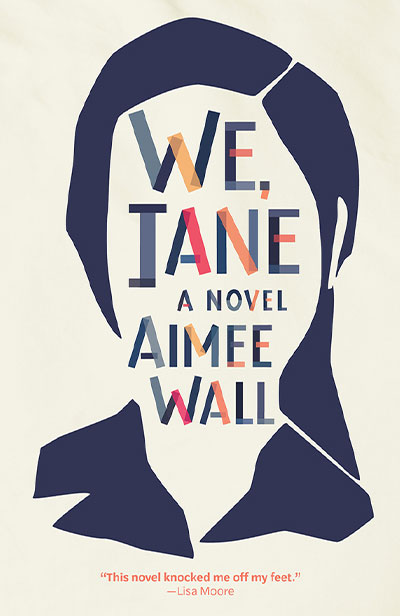
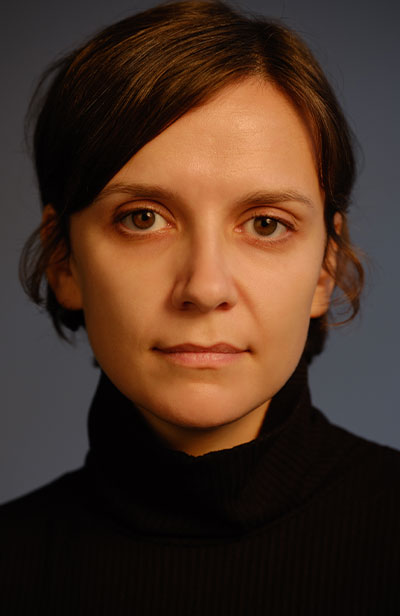
Newfoundland-native Aimee Wall is a writer and translator. Her essays, short fiction, and criticism have appeared in numerous publications, including Maisonneuve, Matrix Magazine, the Montreal Review of Books, and Lemon Hound. Wall’s translations include Vickie Gendreau’s novels Testament (2016), and Drama Queens (2019), and Sports and Pastimes by Jean-Philippe Baril Guérard (2017). She lives in Montreal. We, Jane is her first novel.
Instagram: @aimeelouisewall
Website: www.aimeewall.com
We, Jane by Aimee Wall
The film was a documentary about a Dutch doctor who travelled by boat to countries where abortion was illegal, picking up women and administering the abortion pill to them on board, back out in international waters. They went to Ecuador and unfurled a banner off the Virgin of El Panecillo with a number to a hotline that would give instructions on inducing a miscarriage. It was all more spectacle than practical, really; it was media attention, the ship a galvanizing force for frenzied activists on both sides. But they were doing something. Marthe had heard about the ship before but hadn’t known they were using the pill. She had been imagining a kind of miniature surgical theatre on board something that turned out to be the size of a crab boat. Really, the doctor was just there to monitor women who took a pill, illegal in their countries, that made them bleed. Adjust the blanket around their shoulders. All that fuss for that.
Partway through the film, Marthe noticed a man standing just to the side of the screen, facing the wrong way. He had dark circles under his eyes, an otherwise pasty white face, a shaved head. Camo pants and a scruffy black backpack. One hand on the handlebars of a beater bicycle. He was surveying the crowd. Marthe drew her knees tighter to her chest. The pigeons flustered around his feet and he was motionless, scowling. She tried to return her attention to the screen, where a mob of similarly twisted white male faces were spitting mad screaming at the little crab boat as it tried to dock in Poland. But the man remained at his station, just to the left of her peripheral vision. At a crescendo in the film, as the women on board tried to dock the boat, tried to find some way through the angry mass on shore, the man suddenly wrenched the backpack off his back and threw it to the ground and Marthe flinched, ducked her head. But nothing happened. He put one foot on the bag and kept scowling theatrically and the woman next to Marthe thrust her chin in the man’s direction and then shook her head, and Marthe relaxed slightly, smiled at her. Shook her own head at herself. They were in Montreal. It was not likely.
When the film ended, a woman got up with a microphone to introduce someone connected with the boat doctor, and the crowd thinned quickly. Those remaining, Marthe among them, slid a little closer.
There was a dampening Q and A, a lot of fired-up audience members wondering how they could join up, as if it were a navy fleet, and the guest speaker smilingly shrugging that there was no real way to join up or work with this particular group, apart from giving them money and attention. It wasn’t a fleet. Marthe wished they at least had ambitions of a fleet. Something. The crowd stirred and mumbled. It was starting to turn. Marthe was itching again. The women felt like she did, maybe. It had been two years, but Marthe was still angry at the indignity of it all, at the insistence of the physical body. She wanted there to be a fight about it. She wanted to join up but there was nothing to join.
—
Excerpted from WE, JANE. Copyright © 2021 by Aimee Wall. Excerpted by permission of Book*hug Press. All rights reserved. No part of this excerpt may be reproduced or reprinted without permission in writing from the publisher.
Of the 2021 longlist, the jury writes:
In a year of logistical challenges and the continued relevance of Zoom, the jury of the 2021 Scotiabank Giller Prize has emerged from many hours of private reading and many rounds of lively debate with a longlist of twelve titles. This extraordinary dozen showcases an ecstatic diversity of voices and styles, of narrative deployment and moral urgency, of formal innovation and old-fashioned storytelling pleasure. There is something for everyone on this list, but within each of these books there is to be found beauty, honest reckoning, human compassion, and the irrefutable mark of the sublime. It was the jury’s great honor to delight in the manifold achievements of these books, and with their announcement we leave this debate settled for another year: Canada’s literature is as vibrant and expansive as ever.
2021 Jury
The Scotiabank Giller Prize is pleased to announce the award-winning, five-member jury panel for the 2021 Prize.
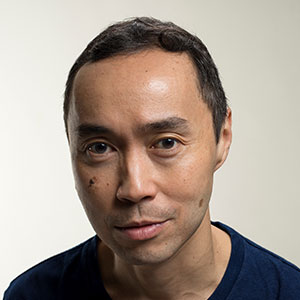
Tash Aw
Tash Aw
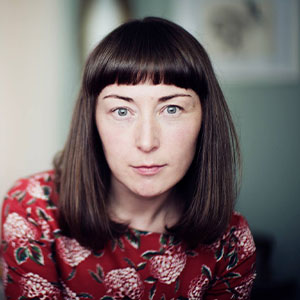
Megan Gail Coles
Megan Gail Coles

Joshua Ferris
Joshua Ferris
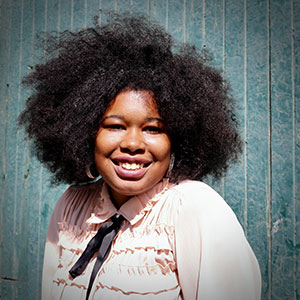
Zalika Reid-Benta
Zalika Reid-Benta
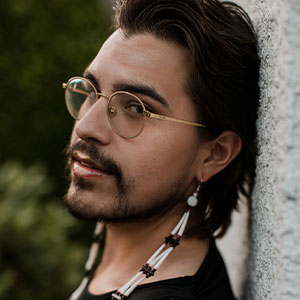
Joshua Whitehead
Joshua Whitehead
Sign up for our newsletter
We’ll keep you in the loop about upcoming announcements, the Giller Book Club,
Giller Master Panels and other exciting #CanLit news.
